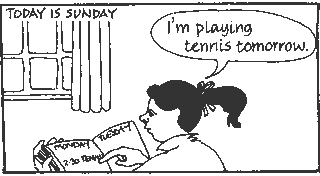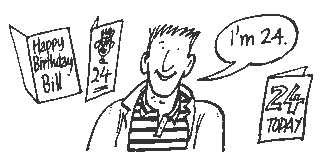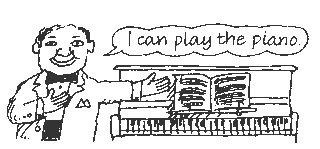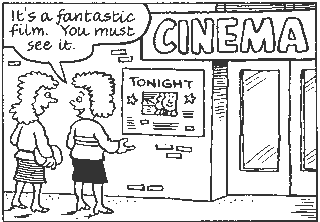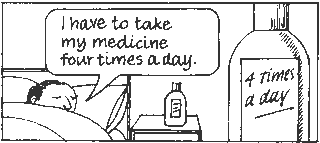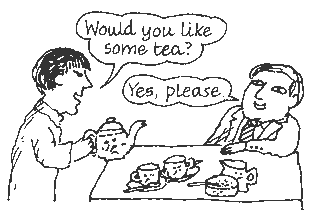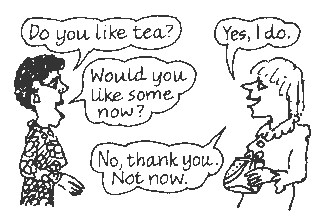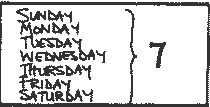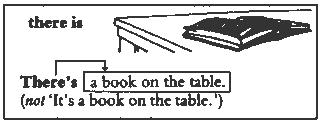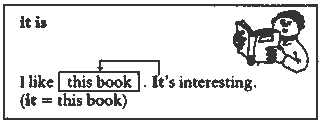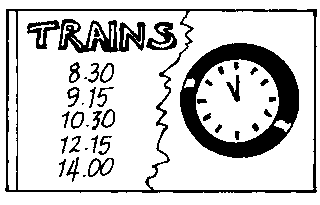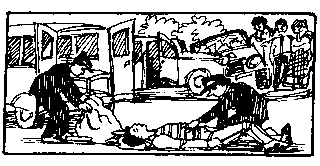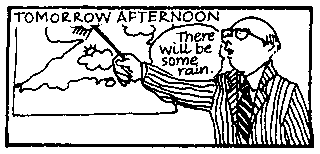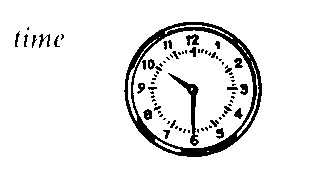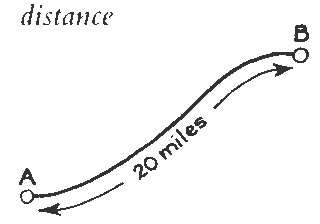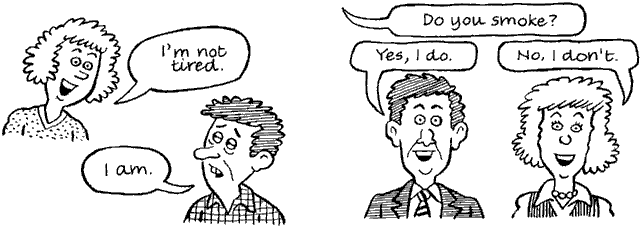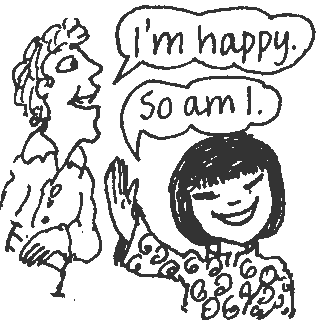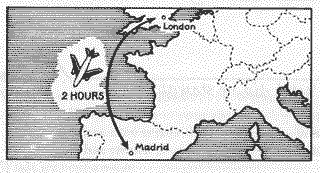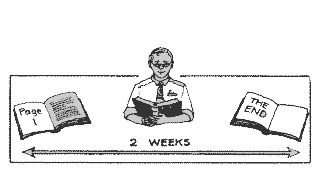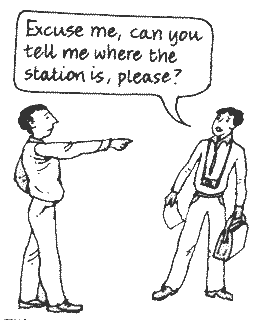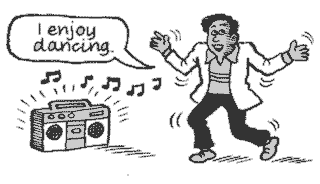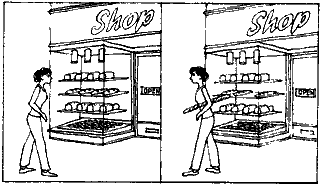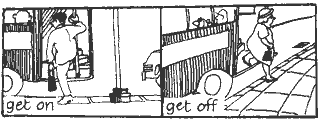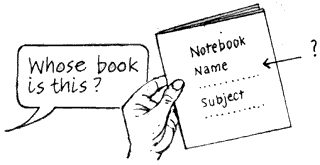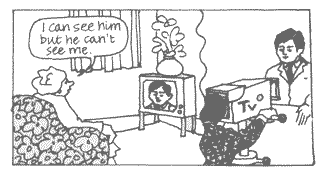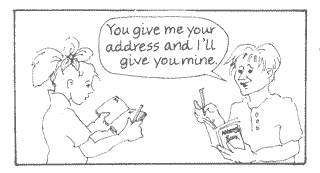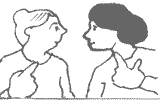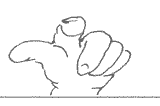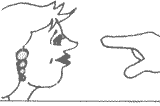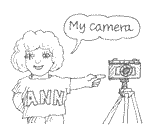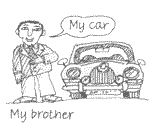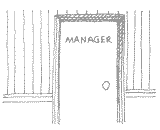IT related English
LANGUAGE BASICS
Английский
язык
с уклоном на ИКТ
(Основы языка)
Учебное пособие по изучению английского языка
для преподавателей колледжей
Ташкент 2006
Данное учебное пособие разработано в рамках узбекско-немецкого проекта «Содействие профессиональному образованию» и предназначено для преподавателей колледжей по курсу «Английский язык, ориентированный на Информационные технологии». Пособие функционально содержит два блока: в первом блоке уроков, состоящем из 10 разделов, приведены материалы для обучения, представляющие курс грамматики английского языка; он позволяет повторить и закрепить навыки по английской грамматике, с наглядными примерами и объяснениями. Во втором блоке, состоящем из 10 разделов, представлен непосредственный практикум занятий по английскому языку, даны основы контроля и развития грамматических, лексических навыков; для работы подобраны тексты из оригинальной литературы по информационным технологиям, которые по тематике дополняют имеющиеся по этому направлению тексы. Работа над текстами рассчитана как на коллективно-групповой, так и на индивидуальный метод работы, в режиме взаимокорнтроля: переводы, грамматические упражнения, тексты и вопросы к ним.
|
Содержание
|
||
|
1 |
Часть 1. Основы грамматики английского языка |
|
|
|
Раздел 1. Использование настоящего времени |
|
|
|
Unit 1. am/ is/ are
|
|
|
|
Unit 2. am/ is/ are
(questions) |
|
|
|
Unit 3. I am doing
(present continuous) |
|
|
|
Unit 4. Are you -ing?
(Present Continuous questions) |
|
|
|
Unit 5. I do/ work/ like
etc. (Present Simple) |
|
|
|
Unit 6. I don’t … (Present Simple negative) |
|
|
|
Unit 7. Do you …? (Present Simple questions) |
|
|
|
Unit 8. I am doing (Present Continuous) and I do (Present Simple) |
|
|
|
Раздел 2. Использование прошедшего времени |
|
|
|
Unit 9. I watched/ cleaned/
went etc. (Past Simple) |
|
|
|
Unit 10. I didn’t … Did you …?
(Past Simple negative and questions) |
|
|
|
Unit 11. was/ were
|
|
|
|
Unit 12. I was doing …
(Past Continuous) |
|
|
|
Unit 13. I was doing …
(Past Continuous) and I did … (Past Simple) |
|
|
|
Unit 14. have/ has (got)
|
|
|
|
Раздел 3. Использование настоящего совершенного времени |
|
|
|
Unit 15. I have done …
(Present Perfect 1) |
|
|
|
Unit 16. Have you ever …
(Present Perfect 2) |
|
|
|
Unit 17. How long have you …
(Present Perfect 3) |
|
|
|
Unit 18. for since ago |
|
|
|
Unit 19. I have done …
(Present Perfect) and I did … (Past Simple) |
|
|
|
Раздел 4. Использование страдательного залога |
|
|
|
Unit 20. it is done/ it was done
(passive) |
|
|
|
Раздел 5. Использование будущего времени |
|
|
|
Unit 21. What are you doing
tomorrow? (Present for the future) |
|
|
|
Unit 22. I’m going to … |
|
|
|
Unit 23. will/ shall (1) |
|
|
|
Unit 24. will/ shall (2) |
|
|
|
Раздел 6. Модальные глаголы |
|
|
|
Unit 25. can and could |
|
|
|
Unit 26. may and might |
|
|
|
Unit 27. must |
|
|
|
Unit 28. should |
|
|
|
Unit 29. have to |
|
|
|
Unit 30. Would you like …? |
|
|
|
Раздел 7. Смысловые конструкции 1. Правильные и неправильные глаголы. |
|
|
|
Unit 31. there is/ there are |
|
|
|
Unit 32. there was/ were/ has been/ will be |
|
|
|
Unit 33. it … |
|
|
|
Unit 34. go/ going work/ working/ play/ playing etc. |
|
|
|
Unit 35. be/ have/ do
in present and past tenses |
|
|
|
Unit 36. Regular and irregular verbs |
|
|
|
Unit 37. I am / I don’t etc. |
|
|
|
Unit 38. Have you …? / Are you …? / Don’t you …? etc. |
|
|
|
Unit 39. too / either so am I/ neither do I etc. Unit 40. Negatives: isn’t/ haven’t/ don’t etc. |
|
|
|
Раздел 8. Образование вопросительных предложений |
|
|
|
Unit 41. Questions (1) Is it …? Have you …? Do they …? etc. |
|
|
|
Unit 42. Questions (2) Who saw you …? Who did you see? |
|
|
|
Unit 43. Questions (3) Who is she talking to? What is it like?
|
|
|
|
Unit 44. What …? Which …? How …? |
|
|
|
Unit 45. How long does it take? |
|
|
|
Unit 46. Can you tell me where …? Do you know what …? etc. |
|
|
|
Раздел 9. Смысловые конструкции 2. |
|
|
|
Unit 47. to … (I want to do) and -ing (I enjoy doing) |
|
|
|
Unit 48. I want you to …/ I told you to … |
|
|
|
Unit 49. He said that …/ He told me that … |
|
|
|
Unit 50. I went to the shop to buy … |
|
|
|
Unit 51. get |
|
|
|
Unit 52. go |
|
|
|
Раздел 10. Местоимения |
|
|
|
Unit 53. I/me, he/ him, they/ them etc. |
|
|
|
Unit 54. my/his/their etc.
|
|
|
|
Unit 55. Whose is this? It’s mine. |
|
|
|
Unit 56. I/me/my/mine |
|
|
|
Unit 57. myself/yourself/himself etc. |
|
|
|
Unit 58. -’s (Ann’s camera/my brother’s car etc.) |
|
|
|
Раздел 11. Употребление артиклей и предлогов с именами существительными |
|
|
|
Unit 59. Артиклиa/an
|
|
|
|
Часть 2. Практикум по закреплению навыков. |
|
|
|
Раздел 1. Работа с текстами |
|
|
|
Unit 1. ACCESS METHODS |
|
|
|
Unit 2. VIRTUAL MEMORY |
|
|
|
Unit 3. ADMINISTRATIVE APPLICATIONS |
|
|
|
Unit 4. AIKEN, HOWARD |
|
|
|
Unit 5. ALGOL |
|
|
|
Unit 6. ALGORITHMICS |
|
|
|
Unit 7. Analog Computer: The End of an Era |
|
|
|
Unit 8. APPLE COMPUTER, INC. Apple's Beginnings |
|
|
|
Unit 9. APPLICATIONS PROGRAMMING |
|
|
|
|
|
|
|
|
|
UNIT 1. The World of Telecommunication………………………....................... 4
Part I. Text and exercises ………………………………. 4
Part II. Dialogues………………………………………… 10
UNIT 2. Modern Computer………………....…………… 14
Part I. Text and exercises …………………….…………. 14
Lesson 1………………….………………………………… 14
Lesson 2………………………….………………………… 22
Part II. Dialogues…………………………………………… 29
Part III. Humor Page…………………………….……….. 39
UNIT 3. The Internet and Modern Life….……………. 44
Part I. Text and exercises ………………………….……. 44
Lesson 1…………………………….……………………… 44
Lesson 2……………………………….…………………… 52
Part II. Humor Page…………………………...………….. 60
Часть 1. Основы грамматики английского языка.
Раздел 1. Использование настоящего времени
Unit 1. am/ is/ are
(спряжение
глагола "to be" в единственном и множественном числе простого
настоящего времени)
|
|
|
positive
|
negative
|
- Can you close the
window, please? I'm cold.
- I'm 32 years old. My sister is 29.
- My brother is a policement. He's very tall.
- John is afraid of dogs.
- It's 10 o'clock. You're late again.
- Ann and I are very good friends.
- My shoes are very dirty. I must clean them.
- I'm tired but I'm not
hungry.
- Tom isn't interested in politics.
- Jane isn't at home at the moment. She's at
work.
- Those people aren't English. They're
Australian.
That's = that is There's =
there is Here's = here is
- Thank you. That's very kind of you.
- Look! There's George.
See Unit 2. am/ is/ are (questions)
Unit 2. am/ is/ are (questions)
(спряжение глагола "to be" в единственном и множественном числе
простого настоящего времени в вопросах)
See Unit 1.
am/ is/ are
|
|
|
positive
|
question
|
- Is your mother
at home? No, she's out.
- Is it cold in your room? Yes, a little.
- Those shoes are nice. Are they new?
- Are books expensive in your country?
- How old is Joe? He's 24.
- What colour is your car? It's blue.
- Where are you from? Canada.
- How much are these postcards? They're 40
pence each.
what's = what is who's = who
is how's = how is where's
= where is
- What's the time?
- Where's Jill?
- Who's that man?
- How's your father?
|
short answer - positive
|
short answer - negative
|
- Are you tired? Yes,
I am.
- Are you hungry? No, I'm not but I'm
thirsty.
- Is he English? Yes, he is.
- Is Ann at work today? No, she isn't.
- Is this seat free? Yes, it is.
- Are these your shoes? Yes, they are.
- Am I late? No, you aren't.
Unit 3. I am doing
(Present Continuous)
(настоящее продолженное время)
|
|
- She's eating.
She isn't reading.
- It's raining. The sun isn't shining.
- They're running. They aren't walking.
The Present Continuous Tense is:
|
|
|
- Please be quiet. I'm
working. (= I'm working now)
- Look! Joy is wearing her new hat. (= she's
wearing it now)
- Don't go out now. It's raining.
- "Where are the children?" "They're playing
in the garden."
- (on the telephone) We're having dinner now.
Can you phone later?
- You can turn the television off. I'm not watching
it.
come - coming, smoke - smoking,
wtite - writing
run - running, sit - sitting,
swim - swimming
lie - lying, die - dying
See Unit 4. Are you -ing? (Present Continuous
questions)
See Unit 8. I am doing (Present Continuous)
and I do (Present Simple)
See Unit 21. What are you doing tomorrow?
(Present for the Future)
Unit 4. Are you -ing? (Present Continuous questions)
(вопросительные предложения в настоящем продолженном времени)
See Unit 3. I am doing (Present Continuous)
|
|
-
Are you feeling okay? Yes, I'm
feeling fine.
- Is it raining? Yes, take an umbrella.
- Why are you wearing a coat? It's not cold
today.
- What's Roy doing? He's
cooking the dinner.
- What are the children doing? They're
playing in the garden.
- Look! There's Jan. Where's she doing?
|
The word order in these questions is: |
|||||
|
|
is/are |
+ |
subject |
+ |
-ing |
|
|
Is |
|
he |
|
working today? |
|
|
Is |
|
Mr.Smith |
|
working today? |
|
Where |
are |
|
they |
|
going? |
|
Where |
are |
|
those people |
|
going? (not Where are going those people?) |
|
positive
|
negative
|
-
Are you listening to the radio? Yes,
I am.
- Is Tom working today? Yes, he is.
- Is it raining? No, it isn't.
- Are your friends staying at a hotel? No, they aren't.
Unit 5. I do/ work/ like
etc. (Present Simple)
(спряжение глаголов в простом настоящем времени)
|
|
|
|
They have a lot of
books. |
He's eating an ice-cream. |
They read/ I like/ he likes etc. = The Present Simple
|
Remember:
|
|
-es after -s/ -ch/ -sh |
pass → pases |
watch → watches |
finish → finishes |
|
also: |
do → does |
go → goes |
|
|
|
study → studies |
carry → carries |
|
We use the Present Simple for things
that are true in general, or for things that happen sometimes or all the time:
- I like big cities.
- The shops open at 9 o'clock and close at 5:30.
- He works very hard. He starts at 7:30 and finishes at 8 o'clock in the evening.
- The Earth goes round the Sun.
- We do a lot of different things in our free time.
- She's very clever. She speaks four languages.
- It costs a lot of money to stay at luxury hotels.
We use the Present Simple with always/ never/ often/
sometimes/ usually:
- He always gets up at 7 o'clock.
- I usually go to work by car but I sometimes walk.
- Jack eats very little. He never has
breakfast in the morning.
- The weather here is not very good. It often rains.
See Unit 6.
I don't … (Present
Simple negative)
See Unit 7.
Do you …? (Present
Simple questions)
See Unit 8.
I am doing (Present
Continuous) and I do (Present Simple)
See Unit 88.
Word order (2)
Unit 6. I don't …
(Present Simple negative)
(Отрицательные формы глаголов в простом настоящем времени)
See Unit 5. I do/ work/ like etc. (Present
Simple)
The Present Simple negative is don't/ doesn't + verb
|
|
|
She doesn't smoke. |
He doesn't work. |
|
positive
|
negative
|
- I drink coffee but I don't
drink tea.
- Sue drinks tea but she doesn't drink
coffee.
- You don't speak English very well.
- They don't watch television very often.
- Rice doesn't grow in the cold countries.
- We don't know many people in this town.
We use don't/ doesn't + infinitive (like/ do/
speak/ work etc.):
- I don't like washing the car. I don't do it
very often.
- She speaks Spanish but she doesn't speak
Italian. (not she doesn't speaks)
Remember:
|
I/ we/ you/ they |
|
don't |
|
I don't like football. |
|
he/ she/ it |
|
doesn't |
|
He doesn't like football. |
-
I don't like Fred and Fred doesn't like me. (not Fred
don't like)
- My car doesn't use much petrol. (not my car don't
use)
- Sometimes he is late but it doesn't happen very often.
See Unit 7. Do
you …? (Present Simple questions)
Unit 7. Do you …? (Present Simple questions)
(Вопросительные предложения в простом настоящем времени)
See Unit 5.
I do/ work/ like etc.
(Present Simple)
See Unit 6.
I don't … (Present
Simple negative)
We use do/does in Present Simple questions:
|
positive
|
question
|
|
|
The word order in these questions is: |
|||||
|
|
do/does |
+ subject |
+ |
infinitive |
|
|
|
Do |
you |
|
work |
on Saturdays? |
|
Where |
do |
your parents |
|
live? |
|
|
|
Do |
they |
|
like |
music? |
|
How often |
do |
you |
|
wash |
your hair? |
|
What |
do |
you |
usually |
do |
at weekends? |
|
|
Does |
Chris |
often |
play |
tennis? |
|
How much |
does |
it |
|
cost |
to fly to Rome? |
|
What |
does |
this word |
|
mean? |
|
What do you do? = What's your job?:
- What do you do? I work in a bank.
Remember:
|
do |
|
I/ we/ you/ they |
|
- |
|
Do they like music? |
|
does |
|
he/ she/ it |
|
- |
|
Does he like music? |
short answers
|
|
- Do you smoke? No,
I don't.
- Do they speak English? Yes, they do.
- Does he work hard? Yes, he does.
- Does your sister live in London? No, she doesn't.
See Unit 8.
I am doing (Present
Continuous) and I do (Present Simple)
Unit 8. I am doing (Present Continuous) and I
do (Present Simple)
(Смысловое различие предложений с глаголами в простом и продолженном
настоящем времени)
See Unit 3. I am doing (Present Continuous)
See Unit 4.
Are you -ing?
(Present Continuous questions)
See Unit 5.
I do/ work/ like etc.
(Present Simple)
See Unit 6.
I don't … (Present
Simple negative)
See Unit 7.
Do you …? (Present
Simple questions)
|
Jim is watching
television. |
|
Is he playing the guitar? No, he isn't. (Present
Continuous)
Does he play the guitar? Yes, he does. (Present
Simple)
Present Continuous (I am doing) - now, at the time of
speaking:

- Please be quiet. I am
working.
- Tom is having a shower at the moment.
- Take an umbella. It's raining.
- You can turn off the television. I'm not watching it.
- Why are you under the table? What are you doing?
Present Simple (I do) - in general, all the time or
sometimes:

- I work every day from 9 o'clock until 5.00.
- Tom has a shower every morning.
- It rains a lot in winter.
- I don't watch television very often.
- What do you ususally do at the weekend?
Do not use these verbs in the present continuous (I am -ing):
want like love hate
need prefer depend know
mean understand believe remember
forget
Use the Present Simple only (I want/do you like? etc.):
- I'm tired. I want to go home. (not I'm wanting)
- Do you know that girl? Yes, but I forget
her name.
- I don't understand. What do you mean?
Раздел 2. Использование прошедшего времени
Unit 9. I watched/ cleaned/ went etc. (Past Simple)
(простое прошедшее время)
|
|
The Past Simple is often -ed.
For
example:
|
word - worked |
clean - cleaned |
start - started |
|
stay - stayed |
live - lived |
dance - danced |
These verbs are regular
verbs.
- I clean my teeth every morning. This morning I cleaned my teeth.
- Terry worked
in a bank from 1981 to 1986.
- Yesterday it rained
all morning. It stopped
at launchtime.
- We enjoyed
the party last night. We danced
a lot and talked
to a lot of people.
- The party
finished
at midnight.
|
study - studied |
marry - married |
|
stop - stopped |
plan - planned |
Some verbs are irregular
(not regular). The Past Simple is not
-ed.
Here are some important irregular verbs
|
|
|
|
- I usually get up early but this morning I got up at 9.30.
- We did
a lot of housework yesterday.
- Caroline went
to the cinema three times last week.
- Mr Todd came
into the room, took
off this coat and sad
down.
See Unit 10. I didn't… Did you …? (Past Simple negative and questions)
Unit 10. I didn't … Did you
…? (Past Simple
negative and questions)
(отрицательные и вопросительные предложения в простом прошедшем времени)
See Unit 9. I watched/ cleaned/ went etc. (Past Simple)
We use did
in Past Simple negatives and questions:
|
infinitive
|
positive
|
negative
|
question
|
do/does
(Present) - did (Past):
- I don't
watch television very often.
- I didn't
watch television yesterday.
- Does
she often go out?
- Did
she go out last night?
We use did/didn't
+ infinitive (watch/ clean/do
etc.):
|
I watched |
but |
I didn't watch |
(not
I didn't watched) |
- I played
tennis yesterday but I didn't
win.
- Don didn't have
breakfast this morning. (not
Don hadn't breakfast)
- They went
to the cinema but they didn't
enjoy the film.
- We didn't do
much work yesterday.
Note the word order in questions with did:
|
|
did
|
+ subject
|
+ infinitive
|
|
short answers
|
short answer - positive
|
short answer - negative
|
- Did you see Joe
yesterday? No, I
didn't.
- Did it
rain on Sunday? Yes,
it did.
- Did Helen
come to the party? No,
she didn't.
- Did your friends
have a good holiday? Yes,
they did.
Unit 11. was/ were
(спряжение глагола "to be" в единственном и множественном числе
простого прошедшего времени)
|
|
Now Charlie is
at work. |
am/is
(present) - was (past):
|
- I am
tired. |
I was
tired last night. |
are (present) - were (past):
|
- You are
late (now). |
You were
late yesterday. |
|
positive
|
negative
|
question
|
- Last year she was
22, so she is
23 now.
- When I was
a child, I was
afraid of dogs.
- We were
tired after the journey but we weren't
hungry.
- The hotel was
very comfortable and it wasn't
expensive.
- Where were
you at 3 o'clock yesterday afternoon?.
- Was
the weather good when you were
on holiday?
- Those shoes are nice. Were they expensive?
- Why was
he angry yesterday?
short answers
|
short answer - positive
|
short answer - negative
|
-
Were you late? No,
I wasn't.
- Was Ted
at work yesterday? Yes,
he was.
- Were they
at the party? No, they weren't.
Unit 12. I was doing
(Past Continuous)
(прошедшее продолженное время)
|
Now it is 6 o'clock. |
|
|
|
was/ were -ing
(doing/
playing/
working
etc.) is the Past
Continuous tense:
|
positive
|
negative
|
question
|
- What were
you doing
at 11.30 yesterday? I was
working.
- What did he say? I don't know. I wasn't
listening.
- It was
raining,
so we didn't go out.
- In 1980 they were
living
in Canada.
- Today she's wearing a skirt, but yesterday she was wearing trousers.
- I woke up early yesterday. It was a beautiful morning. The sun was shining and the birds were singing.
am/ is/ are -ing
(Present) - was/ were -ing (Past):
|
- I'm
working
(now). |
I was
working
at 10.30 last night. |
See Unit 13. I was doing (Past Continuous) and I did (Past Simple)
Unit 13. I was doing … (Past
Continuous) and I did … (Past Simple)
(смысловое различие предложений в простом и продолженном прошедшем времени)
|
|
What happened?
The phone rang.
(Past Simple)
What was Jack doing
when the phone rang?
He was reading
a book. (Past Continuous)
What did he do
when the phone rang?
He stopped
reading and answered
the phone. (Past Simple)
Jack began reading before
the phone rang. So:
When
the phone rang, he was
reading.
|
|
- Jack was reading the
newspaper when the phone rang.
but Jack read the newspaper yesterday.
- Were you watching
television when I phoned you?
but Did
you watch the film on television last night?
- I started work at 9.00 and finished at 4.30. At 2.30 I was working.
- When we went out, it was raining. (= it started raining before we went out)
- I saw Lucy and Tom this
morning. They were standing
at the bus-stop.
- Joy fell asleep while she was reading.
Unit 14. have/ has (got)
(использование have/has и have/has got)
You can say have or have got, has or has got:
|
- I've
got blue eyes. (or
I have got
blue eyes.)
- Tim has got
two sisters. (or
Tim has
two sisters.)
- They like animals. They've
got a horse, three dogs and six cats.
- This car has got
four doors.
- I don't feel very well. I've got
a headache.
|
negative
|
question
|
short answers
|
- I've got
a motor-bike but I have't
got a car.
- Mr and Mrs Harrison haven't
got any children.
- It's a nice house but it hasn't
got a garden.
- "Have you got
a camera?" "Yes,
I have"
- "What have you
got in your bag?" "Nothing. It's empty."
- "Has Ann got
a car?" "Yes,
she has".
- What kind of car has
she got?
In negatives and questions you can also use do/does + have:
- They don't have
any children. (= They haven't
got any children.)
- It's a nice house but it doesn't
have a garden. (= it hasn't
got a garden)
- Does
Ann got
a car? (= Has
Ann got
a car?)
- How much money do
you have?
(= How much money have
you got?)
The past is had.
In negatives and questions we use did
+ have
See Unit 9. I watched/ cleaned/ went etc. (Past Simple)
See Unit 10. I
didn’t … Did you …? (Past Simple negative and questions)
Раздел 3. Использование настоящего совершенного времени
Unit 15. I have done (Present Perfect I)
(настоящее совершенное время 1)
|
|
|
|
|
|
|
|
has cleaned/ have gone
etc. is the Present
Perfect (have/
has + Past
Participle*):
|
|
We use the Present Perfect for an
action in the past with a result now:
- I've lost
my passport. (= I can't find my passport now)
- She's
(= she has) gone
to bed. (= she is in bed now)
- We've bought
a new car. (= we have a new car now)
- It's Kay's birthday tomorrow and I haven't
bought her a present.
- "Bob is on holiday." "Oh, where has he gone?"
- "Are they still having dinner?" "No, they've finished."
|
* The Past Participle of regular
verbs is -ed:
|
See Unit 16. Have you ever … (Present Perfect 2)
See Unit 17. How
long have you … (Present Perfect 3)
See Unit 19. I
have done … (Present Perfect) and I did … (Past
Simple)
Unit 16.
Have you ever …? (Present Perfect 2)
(настоящее совершенное время 2)
See Unit 15 I have done (Present Perfect 1)
|
|
We use the Present Perfect
have been/ have
played/ have done etc. when we talk about a time from the past
until now - for example, your life:
|
|
- "Have you been
to France?" (in your
life) "No, I haven't."
- I've been
to Canada but I haven't
been to the United States.
- She is an interesting person. She has
done many different jobs and has visited many countries.
- I've seen
that woman before but I can't remember when.
- How many times has Brazil won the World Cup?
- "Have you read
this book?" "Yes, I've
read it twice." (= two times)
You can use the Present
Perfect + ever
(in questions)
and never:
- "Has
Ann ever been
to Australia?" "No, never."
- "Have
you ever played
golf?" "Yes, once." (= one time)
- My mother has never
travelled by air.
- I've never ridden a
horse.
gone
and been
|
|
|
|
He's gone to Spain. |
He's been to Spain. |
Compare:
- I can't find Susan. Where has
she gone? (= Where is she now?)
- Oh, hello, Susan. I was looking for you. Where have you been?
See Unit 19 I have done (Present
Perfect) and I
did (Past
Simple)
Unit 17.
How long have you …? (Present Perfect 3)
(настоящее совершенное время 3)
|
|
|
|
She is in London now. |
|
|
(is = present) |
|
but |
She has been in London |
|
since Monday. |
(has been = Present Perfect) |
|
|
|
|
|
|
|
Compare:
|
Present Simple
|
but |
Present Perfect
|
||||
|
|
|
|
Present Continuous
|
but |
Present Perfect Continuous (have been -ing)
|
||||
|
|
|
See Unit 18 for since ago
Unit 18.
for since ago
(предлоги времени)
See Unit 17 How
long have you … (Present Perfect 3)
for
and since
We use for
and since
to say how long:
|
|
|
We use since
+ the start of the period
(Monday/ 9 o'clock etc.):
|
|
|
Compare:
- Barry has been in Canada since
January. (= from January to now)
- Barry has been in Canada for
six months. (not
since six months)
- I've known her since
1980. (= from 1980 to now)
- I've known her for a
long time. (not
since a long time)
See Unit 92 from … to until
since for
ago = before now:
- Susan started
her new job two weeks
ago. (= two weeks before now)
- "When did Tom
go out?" "Ten
minutes ago." (= ten minutes before now)
- I had
dinner an hour ago.
(= an hour before now)
- Life was
very different a
hundred years ago.
We use ago
with the Past Simple
(did/ had/ started
etc.)
Compare ago
and for:
- When did she arrive
in London?
- She arrived
in London four days
ago.
- How long has she
been in London?
- She has been
in London for four
days.
Unit 19.
I have done … (Present Perfect) and I did … (Past Simple)
(смысловые различия между предложениями в настоящем совершенном и простом
прошедшем времени)
See Unit 15 I
have done … (Present Perfect 1)
See Unit 16 Have
you ever … (Present Perfect 2)
See Unit 17 How
long have you … (Present Perfect 3)
See Unit 9 I
watched/ cleaned/ went etc. (Past Simple)
See Unit 10 I
didn’t … Did you …? (Past Simple negative and
questions)
We use the Past Simple
(did/ arrived/ saw/
was etc.) with a finished
time (yesterday/
last week/ in 1986/ six months ago etc.):
|
past + finished time |
|
|||||
|
|
We do not use
the Present Perfect
(have done / have
arrived / have been etc.) with a finished time:
- I saw
Jack yesterday.
(not I have
seen Jack yesterday)
- Where were
you last night?
(not Where
have you been last night?)
- We didn't have
a holiday last year.
(not We
haven't had)
- I got
up at 7.15.
I washed, dressed
and then I had
breakfast.
- William Shakespeare (1564-1616) was
a writer. He wrote many plays and poems.
(not … has
been a writer … has written many plays)
Use the Past Simple
to ask When?
or What time?:
- When did
they arrive?
(not When have they
arrived?)
Compare:
|
Present Perfect
|
but |
Past Simple
|
||||
|
|
|
Раздел 4. Использование страдательного залога
Unit 20. it is done/ it was done (passive)
(страдательный залог)
|
|
|
Compare:
Somebody cleans
the room every day. (active)
The room is
cleaned every day. (passive)
Somebody cleaned
the room yesterday. (active)
The room was
cleaned yesterday. (passive)
The Passive
is:
|
|
|
|
Past Participle |
|||||||||||||||||
|
present |
|
+ |
|
|||||||||||||||||
|
|
||||||||||||||||||||
|
past |
The Past Participle
of regular
verbs is -ed
(cleaned/
damaged
etc.). For a list of irregular
past participles (made/
seen etc.), see List
of irregular verbs
|
- Butter is
made from milk. |
|
We say was/ were born:
- I was born
in London in 1958. (not
I am born)
- Where were you born?
passive + by …:
- We were woken up by
the noise. (= The noise woke us up.)
- The telephone was invented by
Alexander Bell in 1876.
- My brother was bitten by
a dog last week.
Раздел 5. Использование будущего времени
Unit 21. What are you doing tomorrow? (Present for the future)
(настоящее в будущем)
|
|
|
|
They are playing tennis now. |
She is playing tennis tomorrow. |
We use am/ is/ are
-ing (Present
Continuous) for something happening now (see Unit 3 I am doing (present continuous) and Unit 4 Are you -ing? (Present Continuous questions)):
- "Where are George and Sue?" "They're playing tennis in
the park."
- Please be quiet. I'm
working.
We also use am/ is/
are -ing for the future
(tomorrow / next week etc.):
- Carol is playing
tennis tomorrow.
- I'm not working next
week.
I am doing something
tomorrow = I have arranged
to do something, I have a plan to do something:
|
- Alice is
going to the dentist on Friday. |
|
You can also say "I'm
going to do something" (see Unit 22 I’m going to …).
Do not use the
Present Simple
(I go/ do you go?
etc.) for arrangements:
- I'm going
out this evening. (not
I go)
- Are you going
out tonight? (not
do you go)
- Ann isn't coming
to the party next week. (not
Ann doesn't come)
But we use the Present
Simple for timetables, programmes, trains etc.:
- The concert starts
at 7.30.
-
What time does the
train leave?
Study the difference:
|
- I'm
going to a concert this evening. |
|
Unit 22. I’m going to …
|
|
She is going to watch
TV this evening.
We use am/ is/ are
going to … for the future:
|
I |
am |
going to |
do … |
|
|
|
|
|
am |
I |
going to |
buy …? |
|
|
|
|
I am going to do
something = I have decided to do something, my intention is to
do something:
|
|
- I'm going to buy
some books tomorrow.
- Sarah is going to
sell her car.
- I'm not going to
have breakfast this morning. I'm not hungry.
- What are you going
to wear to the party on Saturday?
- "Your hair is dirty." "Yes, I know. I'm going to wash
it."
- Are you going to invite
John to your party?
You can say that something is
going to happen when it is clear now that it is sure to happen:
|
- Look at the sky! It's
going to rain. |
|
We also use the Present Continuous (I am -ing) for the future, usually for
arrangements (see Unit 21 What are you doing tomorrow? (Present for
the future)):
- I am playing
tennis with Jack tomorrow.
Unit 23. will/ shall (1)
|
|
Bill is
24 years old now. |
will +
infinitive
(will be
/ will win
/ will come
etc.):
|
We use will
for the future
(tomorrow / next week
etc.):
- She travels a lot. Today she is in London. Tomorrow she'll be in Rome. Next week she'll be
in Tokyo.
- Telephone me this evening. I'll
be at home.
- Leave the old bread in the garden. The birds will eat it.
- We'll
probably go
out this evening.
- Will you be
at home this evening?
- I won't be
here tomorrow. (= I will not be here)
- Don't drink coffee before you go to bed. You won't sleep.
We often say I think …
will…
- I think
Diana will pass
the exam.
- I don't think
it will rain
this afternoon.
- Do you think
the examination will
be difficult?
But do not use
will
for things you have already
arranged to do or decided
to do (see Unit 21 What are you doing tomorrow? (Present for
the future)):
- We're going
to the theatre on Saturday. (not
we will go)
- Are you working
tomorrow? (not
will you work)
shall
You can say I shall
(= I will) and we
shall (= we will):
|
- I
shall be late tommorrow. |
or |
I will
(I'll) be late tomorrow. |
|
|
|
But don't use shall
with you/ they/ he/
she/ it. (not
he shall be late)
See Unit 24 will/ shall
(2)
Unit 24. will/ shall (2)
See Unit 23 will/ shall
(1)
|
|
|
You can use I'll…
(= I will) when you offer
or decide to
do something:
- "My case is very heavy." "I'll carry it for you."
- "I'll phone
you tomorrow, okay?" "Okay, goodbye."
We often say I think
I'll/ I don't think I'll… when we decide to do something:
- I'm tired. I think
I'll go to bed early tonight.
- It's a nice day. I
think I'll sit in the garden.
- It's raining. I
don't think I'll go out.
Don't use the Present
Simple (I
go/ I phone etc.) in sentences like these:
- I'll phone
you tomorrow, okay? (not
I phone you)
- I think I'll go
to bed early. (not
I go to bed)
Don't use I'll…
for something you decided before
(see Unit 21 What are you
doing tomorrow? (Present for the future)):
- I'm working
tomorrow. (not
I'll work)
- I'm going to watch
TV tonight. (not
I'll watch)
- What are you doing
at the weekend? (not
what will you do)
Shall I …? / Shall we
…?
|
|
Shall I / Shall we …?
= Do you think this is a good thing to do? Do you think this is a good idea?
- It's warm in this room. Shall
I open the window?
- "Shall I phone
you this evening?" "Yes, please."
- I'm going to a party tonight. What shall
I wear?
- It's a nice day. Shall
we go for a walk?
- Where shall we go
for our holidays this year?
- "Let's go out this evening." "Okay, what time shall we meet?"
(Let's
see Unit 48 I want you
to …/ I
told you to …)
Раздел 6. Модальные глаголы
Unit 25. can and could
|
|
|
can + infinitive (can do / can play / can come etc.):
|
I can do something.
= I know how
to do it or it is possible
for me to do it:
- I can play
the piano. My brother can
play the piano too.
- Ann can speak
Italian but she can't
speak Spanish.
- "Can you swim?"
"Yes, but not very well."
- "Can you change
twenty pounds?" "I'm sorry I
can't."
- Bill and Jenny can't
come to the party next week.
|
In the past (yesterday / last week etc.): |
|
|
||||||
- When I was young, I could
run very fast.
- Before she came to Britain, she couldn't
speak English. Now she can
speak English very well.
- I was tired last night but I couldn't
sleep.
- Bill and Jenny couldn't
come to the party last week.
|
Unit 26. may and might
|
|
|
may or might + infinitive (may go / might go / may play / might
play etc.):
|
may/ might
= it is possible that something will happen.
You can use may
or might:
- I may go
to the cinema this evening.
or I might go to the
cinema this evening. (= perhaps I will go)
- "When is Kay going to phone you?" "I don't know. She may phone this
afternoon."
- Take an umbrella with you. It might
rain.
- "Do you think Jack will come to the party?" "I'm not sure. He may." (= He
may come.)
- "Are you going out tonight?" "I might." (= I might go out.)
Study the difference:
- I'm playing
tennis tomorrow. (sure)
I may play
tennis tomorrow. (possible)
- Barbara is going
to France next week. (sure)
Barbara might go
to France next week. (possible)
The negative is may
not or
might not:
- I might not go
to work tomorrow. (= perhaps I will not go)
- Sue may not come
to the party. (= perhaps she will not come)
May I
…? = Is it okay to do something?:
- May I smoke?
(= Is it okay if I smoke? / Can I smoke?)
- "May I sit
here?" "Yes,
of course."
Unit 27. must
|
|
must + infinitive (must do / must see etc.):
|
Use must
when you think it is necessary or very important to do something:
- The windows are very dirty. I must
clean them.
- It's a fantastic film. You must
see it.
- We must go
to the bank today. We haven't got any money.
must
is present or future:
- I must go
to the bank now.
- I must go
to the bank tomorrow.
For the past (yesterday / last week
etc.), we use had to
+ infinitive (had to go / had to do / had to write
etc.):
- I had to go
to the bank yesterday. (= It was necessary for me to go to the bank.)
- We had to walk
home last night. There was no bus.
See Unit 29
have to
…
mustn't
(must not)
|
I mustn't
do it = it is important not
to do it, it is a bad thing to do: |
|
needn't
(need not)
I needn't
do it = it is not necessary
to do it, I don't need to do it:
- I needn't clean
the windows. They aren't dirty.
- You needn't go
to the bank. I can give you some money.
You can also say don't
need to … (= needn't):
- I don't need to
clean the windows.
- You don't need to go
to the bank.
Unit 28. should
|
|
should + infinitive (should do / should write etc.):
|
(Someone) should
do something = It is a good thing to do or the right thing to do:
- Tom should go
to bed earlier. He usually goes to bed very late and he's always tired.
- It's a good film. You should
go and see it.
- When you play tennis, you should
always watch
the ball.
shouldn't
(or should not)
= It's not a
good thing to do or it's not the right thing to do:
- Tom shouldn't go
to bed so late.
- You work all the time. You shouldn't
work so hard.
We often
use think
with should:
|
must
(see Unit 27 must) is stronger than should:
- It's a good
film. You should
go and see it.
- It's a fantastic
film. You must
go and see it.
Another way of saying should
is ought to
…:
- It's a good film. You ought
to go and see it. (= You should go and see it.)
Unit 29. have to …
|
|
I have to do something = it is necessary for
me to do it, I am obliged to do it:
|
- I'll be late for work tomorrow. I have
to go to the dentist.
- Jill starts work at 7.00, so she has
to get up at 6.00.
- You have to pass
a test before you can get a driving licence.
The past (yesterday / last week
etc.) is had to
…:
- I was late for work yesterday. I had
to go to the dentist.
- There was no bus, so we had
to walk home.
In questions
and negatives
we use do/does
(present) and did (past):
present
|
do |
I/ we/ you/ they |
|
have to …? |
|
I/ we/ you/ they |
don't |
|
have to … |
|
|
|
|
|
|
|
|
past
|
did |
I/ we/ you/ they |
|
have to …? |
|
I/ we/ you/ they |
|
didn't have to … |
|
|
|
|
|
|
|
- What time do you
have to get up tomorrow morning?
- Does Jill have to
work on Saturdays?
- Why did they have to
leave the party early?
I don't have to
do (something) = it is not
necessary to do it:
- I'm not working tomorrow, so I don't
have to get up early.
- lan doesn't have to
work very hard. He's got an easy job.
- We didn't have to
wait very long. The bus soon came.
have to
and must
(see Unit 27 must)
Use must
when you say what you
think is necessary, when you are giving your
opinion. Usually, have
to is also possible:
- It's a fantastic film. You must
see it. (or
You have to
see it)
Use have to
(not must) when you are not giving your personal
opinion:
- Jill won't be here this afternoon. She has
to go to the doctor. (This is not my opinion - it is a fact. )
- In many countries, men have
to do military service. (This is not my opinion - it is the law in those
countries.)
Unit 30. Would you like …?
|
Would you like … ? = Do you want … ? |
|
We use Would you like
to … ? to invite
someone:
- Would you like to
come to a party?
- "Would you like
to have dinner with me on Sunday?" "Yes, I'd love to. (= I
would love to have dinner with you.)"
- Where would you like
to go this evening?
I'd like (I would
like) is a polite way of saying "I want":
- (in a restaurant)
I'd like fish,
please.
- I'm thirsty. I'd
like a drink.
- I'd like to see
the film on television this evening.
Study the
difference:
|
Would you like … ? / I'd like … |
Do you like … ?/ I like … |
- "Would you like to go to the cinema tonight?" (tonight)"
"Yes, I'd love to go."
but "Do you like going to
the cinema?" (in
general) "Yes, I go to the cinema a lot."
- I'd like
an orange. (= I want an orange now.)
but I like oranges. (in general)
See Unit 47. to … (I want to do) and -ing (I
enjoy doing)
Раздел 7. Смысловые конструкции.
Unit 31. there is, there are
|
|
|
|
singular:
|
- There's
a big tree in the garden. |
plural:
|
- There
are some big trees in the garden. |
· there is and it is
|
|
|
Compare:
- A: What's that noise? B: It's
a train. (it
= that noise)
There's a train at 10.30. It's a fast train. (it = the 10.30
train)
- There is
a lot of salt in this soup.
I don't like this soup. It's too salty. (it = this soup)
Unit 32. there was/ were/ has been/ will be
|
there |
is/are |
see Unit 31 |
|
|
|
|
||||||||
|
||||||
|
||||
Unit 33. it …
· it for time/day/distance/weather
|
|||||||
|
|||||||
|
|||||||
|
· it's nice to … etc
|
It's |
easy/difficult/impossible/dangerous/safe/stupid/ |
to … |
|
|
· It's nice to see you again. (it = to see you again)
· It's impossible to understand her. (it = to understand her)
· It wasn't easy to find your house. (it = to find your house)
· Don't forget it:
· It's raining again. (not Is raining again)
· Is it true that you are married? (not Is true that …?)
Unit 34. go/ going work/ working/ play/ playing etc.
· go/work/play etc. (infinitive)
We use the infinitive
(go/work/play/be
etc.) after:
|
We use the infinitive
with do/does/did:
|
do |
Do you work? |
I don't
work. |
do/does
(Present Simple)
see Unit 6 and Unit 7
did (Past Simple) see Unit 10
· to go / to work / to play etc. (to + infinitive)
We use to
… (to go / to work /
to play / to be etc.) after:
|
· going/working/playing etc.
We use -ing
with am/is/are/was/were:
|
am/is/are |
|
+ -ing |
Present Continuous |
|
|
|
|
|
· Please be quiet. I'm working.
· Tom isn't working today.
· What time are you going out?
· We didn't go out because it was raining.
· What were you doing at 11 o'clock yesterday morning?
See Unit 47 to … (I want to do) and -ing (I enjoy doing)
Unit 35. be/have/do in Present and Past tenses
· be (am/is/are/was/were) -ing (cleaning/working/doing etc.
Present Continuous and Past Continuous
|
- Please be quiet. I'm
working. |
||
|
- I was
working when she arrived. |
· be (am/is/are/was/were) + Past Participle (cleaned/made/eaten etc.)
Passive
|
- The room is
cleaned every day. |
||
|
- I was
working when she arrived. |
· have/has + Past Participle (cleaned/lost/eaten/been/gone etc.)
Present Perfect
|
- I have
cleaned my room. |
· do/does/did + Infinitive (clean/like/eat/go etc.)
Present Simple and Past Simple - negatives and questions
|
- I like coffee but I don't
like tea. |
||
|
- I didn't
watch TV yesterday. |
Unit 36. Regular and irregular verbs
· Past Simple and Past Participle
The Past Simple and Past Participle of regular verbs is -ed:
clean → cleaned live →
lived paint → painted
Past Simple (see Unit 9):
I cleaned
my shoes yesterday.
Charlie studied
engineering at university.
We use the Past Participle
for the Present Perfect
and the Passive.
Present Perfect
= have/has
+ Past Participle
(see Unit 15, see Unit 16, see Unit 17):
- I have cleaned
my shoes.
- Joan has lived
in London for ten years.
Passive = be (am/is/are/was/were)
+ Past Participle
(see Unit 20):
- These rooms are
cleaned every day.
- My car was repaired last
week.
· Irregular verbs
The Past Simple and Past Participle of irregular verbs are not -ed:
|
Sometimes the Past Simple and Past Participle are the same. For example:
|
- I made
a cake yesterday. (Past
Simple)
- I have made
some coffee. (Past
Participle - Present Perfect)
- Butter is made
from milk. (Past
Participle - Present Passive)
Sometimes the past simple and past participle are different. For example:
|
- Somebody broke
this window last night. (Past
Simple)
- Somebody has broken
this window. (Past
Participle - Present Perfect)
- This window was
broken last night. (Past
Participle - Past Passive)
Unit 37. I am /I don't etc.
|
|
|
|
She isn't tired but he
is. |
He smokes but she doesn't. |
|
· We use these verbs with other verbs (am going / has seen / can't come etc.) but you can also use them alone:
- I haven't got a car but my sister has. (= my sister
has got a car)
- ‘Please help me.’ ‘I'm sorry, I can't.’
(= I can't help you)
- ‘Are you tired?’ ‘I
was, but I'm
not now.’ (= I was tired but I'm not tired now.)
- ‘Do you think Ann will come?’ ‘She might.’
(= She might come.)
- ‘Are you going now?’ ‘Yes, I'm afraid I must.’ (= I must go)
· You can use these verbs in this way with Yes … and No …:
- ‘Is it raining?’ ‘Yes, it is.
/ No, it isn't.’
- ‘Have you ever been to Canada?’ ‘Yes, I have. / No, I haven't.’
- ‘Will Alan be here tomorrow?’ ‘Yes, he will.
/ No, he won't.’
· Use do/does for the Present Simple:
- I don't like hot weather but Sue does. (= Sue likes hot weather)
- She works very hard but I don't.
(= I don't work very hard)
- ‘Do you enjoy your work?’ ‘Yes, I do.’
Use did
for the Past Simple:
- ‘Did you and John enjoy the film?’ ‘I did
but John didn't.’
(= I enjoyed it but John didn't enjoy it.)
- ‘Did it
rain yesterday?’ ‘No, it didn't.’
· You cannot use the short forms 'm/'s/'re/'ve/'ll at the end of a sentence. Use the full forms am/is/are/have/will etc.:
- ‘Are you tired?’ ‘Yes, I am.’ (not ‘Yes, I'm.’)
Unit 38. Have you? / Are you? / Don't you? etc.
|
|
· In conversation, you can say have you? / is it? / can't he? etc. to show that you are interested or surprised. You can use these verbs in this way:
am/is/are was/were have/has do/does/did can will.
- ‘You're
late.’ ‘Oh, am
I? I'm sorry.’
- ‘I was
ill last week.’ ‘Were
you? I didn't know that.’
- ‘It's
raining again.’ ‘Is
it? It was sunny five minutes ago.’
- ‘Bill can't
drive.’ ‘Can't
he? I didn't know that.’
- ‘I'm not
hungry.’ ‘Aren't
you? I am.’
- ‘Sue isn't
at work today.’ ‘Isn't
she? Is she ill?’
Use do/does
for the Present Simple,
did
for the Past Simple:
- ‘I speak
four languages.’ ‘Do
you? Which ones?’
- ‘Tom doesn't
eat meat.’ ‘Doesn't
he? Does he eat fish?’
- ‘Linda got
married last week.’ ‘Did she?
Really?’
· Question tags
|
You can use …
have you? /… is it? / … can't she? etc. at the end of a
sentence. These ‘endings’ are question
tags (= mini-questions). |
|
|
||||||||||||
Unit 39. too/either so am I/neither do I etc.
|
too and either |
||||
|
||||
|
So am I / Neither do I etc. |
|||||||||||||||||||||
|
|||||||||||||||||||||
Unit 40.
Negatives: isn’t/ haven’t/ don’t etc.
(отрицательные
предложения с вспомогательными глаголами be, have, do)
· We use not (n't) in negative sentences:
|
positive → negative |
|||
|
·
Present Simple negative (See Unit 6. I don’t … (Present Simple
negative)
(отрицательные формы
глаголов в простом настоящем времени)):
|
I/we/you/they do
not (don't) |
|
+ infinitive (work/live/go etc.) |
|
|
|
Past Simple negative
(See Unit 10. I didn’t … Did you …? (Past Simple negative and questions)
(отрицательные и вопросительные предложения в простом прошедшем времени)):
I/they/he/she etc. did
not (didn't) + infinitive
|
· The negative of ‘Look!’, ‘Go away!’ etc. is ‘Don't… !’:
|
Look! |
→ |
Don't look! |
|
|
|
· Do can also be the main verb (don't do / didn't do etc.):
|
Раздел 8. Образование вопросительных предложений
Unit 41. Questions (1) Is it …? Have
you …? Do
they …? etc.
(вопросительные предложения со вспомогательными глаголами be, have, do)
|
positive |
|
you |
X |
are |
|
You are eating. |
|
|
|
question |
|
are |
you |
|
Are you eating? |
|
What are you eating? |
· In questions, the first verb (is/are/have etc.) is before the subject:
|
· Be careful with word order: the subject is after the first verb:
- Where has
David gone? (not
‘Where has gone David?’)
- Why are those people
waiting? (not ‘Why are waiting
those people?’)
·
Present Simple questions: (See Unit 7. Do you …? (Present Simple
questions)
(вопросительные
предложения в простом настоящем времени)
|
do (I/we/you/they) |
|
+ infinitive (work/live/go etc.) |
|
|
|
Past Simple
questions: (See Unit 10. I
didn’t … Did you …? (Past Simple negative and questions)
(отрицательные и вопросительные
предложения в простом прошедшем времени)):
did (you/they/she etc.) + infinitive
|
Do can
also be the main verb (do
you do / did she do etc.):
- What do you
usually do
at weekends?
- ‘What does your sister do?’ ‘She works in a bank.’
- ‘I broke my leg.’ ‘How did you do that?’ (not
‘How did you that?’)
· Negative questions with Why … ? (Why isn't …? / Why don't … ? etc.): Be careful with word order in these questions:
- Where's John? Why
isn't he here? (not
‘Why he isn't here?’)
- Why can't Paula
come to the meeting? (not
‘Why Paula can't …’)
- Why didn't you
phone me last night?
See Unit 42 Questions
(2) Who saw you …? Who
did you see? and Unit 43 Who
is she talking to? What is it like?
Unit 42.
Questions (2) Who saw you …? Who did you see?
(вопросительные
предложения (2)
|
|
Fred saw Julia. |
|
|
· In these questions who or what is the subject:
- Who
lives in that house? (= Somebody lives there- who?) (not ‘Who does live …?’)
- What happened?
(= Something happened-what?) (not
‘What did happen?’)
- What's (= What is)
burning?
- Who's got (= Who has
got) my key?
· In these questions who or what is the object:
- Who did
you meet yesterday? (= You met somebody - who?)
- What did she say?
(= She said something - what?)
- Who are you phoning?
- What was he wearing?
Compare:
|
- George likes eggs. |
→ |
Who likes eggs? George. |
|
- Jill won some money. |
Who won some money? Jill. |
· Use who for people (somebody), what for things, ideas etc. (something):
- Who is your
favourite singer?
- What
is your favourite song?
Unit 43.
Questions (3) Who is she talking to? What is it like?
(вопросительные предложения (3)
|
|
Julia is talking to
someone. |
· Questions (Who … ? / What… ? / Where … ? / Which … ?) often end with a preposition (to/for/about/with etc.):
- ‘I'm thinking.’ ‘What
are you thinking about?’
- ‘I'm afraid.’ ‘Why? What
are you afraid of?’
- ‘Where
is your friend from?’
‘She's from Germany.’
- ‘Who
does this book belong to?’
‘It's mine.’
- ‘Who
did she go on holiday with?’
‘With her parents.’
- ‘What
does he look like?’
‘He's got a beard and wears glasses.’
- ‘This book is very good.’ ‘Is it? What
is it about?’
- ‘Tom's father is in hospital.’ ‘Which
hospital is he in?’
· What (is/are/was/were) … like?
|
|
‘What is it like?’ = Tell me something about it; is it good or bad, big or small, old or new? etc.
When we say ‘What … like?’, like is a preposition. It is not the verb like (Do you like music? etc.).
- A: I went to the new restaurant last night.
B: Oh, did you? What's
it like?
Good?
A: Yes, excellent.
- A: What's
your new teacher like?
B: She's very good. We learn a lot.
- A: I met Linda's parents yesterday.
B: Oh, what
are they like?
A: They're very friendly.
- A: What
was the weather like
when you were on holiday?
B:
Very nice.
Unit 44. What … ? Which … ? How … ?
· What … ?
What + noun
(What colour … ? /
What kind … ? etc.):
- What colour
is your car? What
colour are your eyes?
- What size
is this shirt? What
kind of job do you want?
- What make
is your TV set? What
time is it?
What without a noun:
- What's
your favourite colour?
- What
do you want to do this evening?
What
and Who
Unit 42. Questions
(2) Who saw you …? Who
did you see?
(вопросительные предложения (2))
· Which … ?
Which + noun (things
or people):
- Which train
did you catch - the 9.50 or the 10.30?
- Which doctor
did you see - Doctor Ellis, Doctor Gray or Doctor Hill?
Which without a noun (not people):
- Which
is bigger - Canada or Australia?
but Who is taller - Bill
or Jerry? (Who
for people)
Which one(s)
Unit 69. one/ ones
· What … ? and Which … ?
We say Which
when we are thinking about a small number (perhaps two, three or four things):
|
- We can go this way or that way. |
|
Use What
in other situations:
- What
is the capital of Italy?
- What
sort of music do you like? (not
‘Which sort … ?’)
Compare:
- What colour
are your eyes? (not
‘Which colour … ?’)
but Which colour do you
prefer, pink or yellow?
· How … ?
- ‘How
was the party last night?’ ‘It was great!’
- ‘How
do you usually go to work?’ ‘By bus.’
How + adjective/adverb (how old / how big / how fast
etc.):
- How old
is your father? How
tall are you? How
big is the house?
- How far
is it to the shops from here?
- How often
do you go on holiday?
Unit 45. How long does it take?
|
|
|
|
How long does
it take by plane from London to Madrid? |
I started reading the book two weeks ago. I finished it today. |
|
||||||||||||||||
- How long does it
take by train from London to Manchester?
It takes two hours
by train from London to Manchester.
- How long does it
take by car from your house to the station?
It takes ten minutes
by car from my house to the station.
|
|||||||||||||||
- How long does it
take to cross the Atlantic Ocean by ship?
- How long will it
take me to learn to drive?
- ‘I came by train.’ ‘Did you? How
long did it take?’
- Did it take you a
long time to find a job?
- It takes a long time
to learn a language.
- It takes me 20
minutes to get to work in the morning.
- It took Tom an hour
to do his shopping.
- It will take me an
hour to cook the dinner.
- It doesn't take long
to cook an omelette.
Unit 46. Can you tell me where …? Do you know what …? etc.
|
|
|
We say: Where is
the station? |
|||||
|
|
|
||||||
|
Who are
those people? |
but |
|
· Questions with do/does/did (Present Simple and Past Simple):
|
Where does he live? |
|
|
Do you know where he lives? |
(not ‘Do you know where does he live?’) |
|
How do
aeroplanes fly? |
but |
|
· Questions beginning Is …? / Do … ? / Can … ? etc. (yes/no questions):
|
Is Jack at home? |
but |
|
You can use if
or whether
in these sentences:
- Do you know if
she smokes? or
Do you know whether
she smokes?
Раздел 9. Смысловые конструкции 2.
Unit 47. to … (I want to do) and -ing (I enjoy doing)
· verbs + to … (I want to do)
|
+ |
to … (to do / to work / to be etc.) |
- What do you want to
do this evening?
- I hope to go
to university next year.
- We have decided to
leave tomorrow morning.
- You forgot to switch
off the light when you went out.
- My brother is learning
to drive.
- I tried to work
but I was too tired.
· verbs + -ing (I like doing)
|
+ |
-ing (doing/working/being etc.) |
|
- I enjoy
dancing.
(not ‘enjoy
to dance’) |
|
|
but |
|
+ |
to … (to do / to work / to be etc.) |
- Jan would like to
meet you. (not
‘would like meeting’)
- I'd love to go
to Australia. (I'd
= I would)
- ‘Would
you like to sit
down?’ ‘No, I'd prefer
to stand, thank you.’
- I wouldn't like to
be a teacher.
See Unit 30. Would you like …?
· verbs + to … or -ing:
|
+ |
to … (to do
etc.) |
- It started raining.
or It started to rain.
- I prefer travelling
by car. or I prefer to travel by
car.
(but would prefer to do something)
Unit 48. I want you to …/ I told you to …
|
|
|
· We say I want (you) to …:
- I want you to be
happy. (not ‘I
want that you are happy.’)
- They didn't want
anybody to know their secret.
|
We also use this structure (verb + somebody + to …) with: |
||||||||||
|
|
|
||||||||
· I told (somebody) to … /I told (somebody) not to …:
|
|
- Tom said (to Ann): ‘Wait
for me!’ -> Tom told
Ann to wait
for him. |
· make and let
After make
and let
we do not use to:
- He's very funny. He makes
us laugh. (not
‘makes us to laugh’)
- I don't want you to go alone. Let
me go with you. (not
‘Let me to go’)
Let's (do
something)
You can say Let's
… (= let us)
when you want people to do things with you:
- Come on! Let's dance!
- ‘Shall we go out tonight?’ ‘No, I'm tired. Let's stay at home.’
· help
You can say help
somebody do
or help somebody to do:
- Tom helped me carry
the box. or
Tom helped me to carry
the box.
Unit 49. He said that …/ He told me that …

· After said that / told (somebody) that… a verb is usually past:
|
· say (-> said) and tell (-> told)
say something (to
somebody): They said
that… (not
‘They said me that …’)
tell
somebody something: They told
me that… / They told
Ann that…
- He said
that he was tired. (not
‘He said me that he was tired.’)
but He told me that he was
tired. (not
‘He told that he was tired.’)
- What did he say to
you? (not
‘say you’)
but What did
he tell you?
(not ‘tell to
you’)
· ‘that’ is not necessary in these sentences. You can say:
- He said that he was tired. or He said he was tired. (without ‘that’)
Unit 50. I went to the shop to buy …
|
Ann didn't have any bread. |
|
· to … (to do / to buy / to see etc.) tells us why a person does something (the purpose):
- ‘Why are you going out?’ ‘To
buy a newspaper.’
- George went to the station to
meet his friend.
- She turned on the TV to
watch the news.
- I'd like to go to Spain to
learn Spanish.
money /time to (do something):
- We need some money
to buy food.
- I haven't got time
to watch television.
· to … and for …:
to + verb:
to buy / to have / to
see etc.
for + noun: for some bread / for dinner / for a
holiday etc.
- She went to the shop to
buy some bread. (to
+ verb)
but She went
to the shop for some
bread. (for
+ noun)
- They are going to Scotland to
see their grandmother. (not
‘for to see’)
but They are
going to Scotland for
a holiday.
- We need some money to
buy food. (not
‘for buy’)
but We need
some money for food.
· wait
wait for somebody/something:
- Are you waiting for
the bus?
- Please wait for me.
wait for
somebody/something to
…:
- I can't go out yet. I'm
waiting for John to phone.
- I was having dinner when they arrived. They waited for me to finish my meal.
See Unit 85. enough
See Unit 86.
too
Unit 51. get
· get something/somebody = receive/buy/fetch/find

- Did you get my
letter last week? (= receive)
- I like your pullover. Where did you get
it? (= buy)
- (on the phone)
‘Hello, can I speak to Ann, please?’ ‘One moment. I'll get her.’ (= fetch)
- Is it difficult to get
a job in your country? (= find)
· get cold/hungry/tired/better etc. (get + adjective) = become

- Drink your coffee. It's
getting cold.
- If you don't eat, you get
hungry.
- I'm sorry he's ill. I hope he gets
better soon.
also: get married
and get lost:
- Linda and Frank are
getting married next month.
- I went for a walk and got
lost. (= I lost my way)
· get to a place (get to work / get to London / get home etc.) = arrive
|
- I usually get
to work before 8.30. (= arrive
at work) |
|
· get in/out/on/off
|
get in (a car) |
get on/get off (a bus, a train, a plane) |
|
|
|
- She got in the car
and drove away. (you can
also say ‘got into
the car’)
- A car stopped and a man got
out. (but
‘got out of the car’)
- They got on
the bus outside the hotel and got
off in Cross Street.
Unit 52. go
· go to … (go to London / go to work / go to a concert etc.)
|
- I'm going
to France next week. |
|
also: go to sleep (= start
to sleep):
- I went to bed and went
to sleep very quickly.
go home
(without to):
- I'm going home
now. (not
‘going to home’)
· go on holiday / a trip / an excursion / a cruise
- We go
on holiday (to Scotland) every year.
- When we were on holiday, we went
on a lot of excursions to
different places.
-
Schoolchildren often go
away on school trips.
· go for a walk / a run / a swim / a drink / a meal / a holiday
- The sea looks nice. Let's go
for a swim.
- Last night we went
out for a meal.
The restaurant was very good.
- ‘Where's Ann?’ ‘She's
gone for a walk in the park.’
- They've gone to
Scotland for a
holiday.
(We say ‘on holiday’
but ‘for a holiday’)
· go swimming / go shopping etc.
We use go -ing for sporting activities (go swimming / go skiing / go jogging / go fishing etc.) and also shopping (go shopping):
|
|
-
We live near the mountains. In winter we go skiing every
weekend.
- She has a small boat and she often goes
sailing.
- Are you going
shopping this afternoon?
- It's a nice day. Let's go
swimming. (or
Let's go for a swim.)
- George went fishing
last Sunday. He
caught a lot offish.
Раздел 10. Местоимения
Unit 53. I/me, he/him, they/them etc.
· people
|
|
|
|
|
|
|
|
|
subject |
I |
we |
you |
he |
she |
they |
|
object |
me |
us |
you |
him |
her |
them |
|
|
Use me/him/her etc. (object) after prepositions (for/to/at/with etc.):
- This letter isn't for
you. It's for
me.
- Where's Alan? I want to talk to
him.
- Who is that woman? Why are you looking at
her?
- We're going to the cinema. Do you want to come with us?
- They are going to the cinema. Do you want to go with them?
· things
|
|
|
|
|
subject |
it |
they |
- I want that book. Please
give it
to me.
- I want those books.
Please give them
to me.
- Diane never drinks milk.
She doesn't like it.
- I never go to parties.
I don't like them.
- ‘Where's the
newspaper?’ ‘You're sitting on it.’
Unit 54. my/his/their etc.

|
We use my/your/his/her etc. + a noun:
|
my hands |
his mother |
her new car |
· his/her/their:
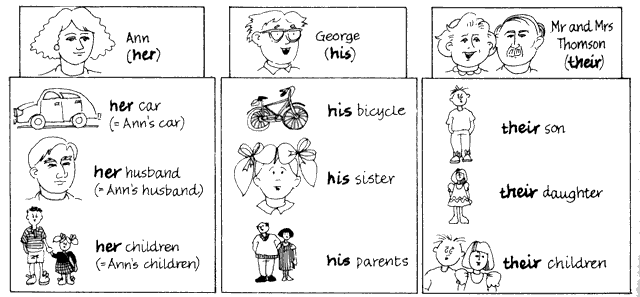
· its and it's:
|
its |
Oxford is famous for its
university. |
Unit 55. Whose is this? It’s mine.

|
|
|
· my/our/your/her/their + a noun (my hands/your book etc.):
- My
hands are cold.
- Is this your book?
- Ann gave me her
umbrella.
- It's their problem, not our problem.
· mine/ours/yours/hers/theirs without a noun:
- These books are mine
but this newspaper is yours.
(= your newspaper)
- I didn't have an umbrella, so Ann gave me hers. (= her umbrella)
- It's their problem, not ours.
(= our problem)
- ‘Is that their car?’ ‘No, theirs
is green.’ (= their car)
· his with or without a noun:
- Is this his
camera?
- It's a nice camera. Is it his?
· We say: a friend of mine/a friend of his/some friends of yours etc.:
- I went out to meet a
friend of mine. (not
‘a friend of me’)
- Are those people friends
of yours? (not
‘friends of you’)
· Whose …?
- Whose
book is this? (= Is it your book? his book? my book? etc.)
You can use whose with or without a noun:
|
Whose money is this? |
|
It's mine. |
|
|
|
Whose shoes are these? |
|
They're John's. |
Unit 56. I/me/my/mine
|
|
|
|
|
I etc. |
me etc. |
my etc. |
mine etc. |
|
|
I know Tom. |
Tom knows me. |
It's my car. |
It's mine. |
|
|
We know Tom. |
Tom knows us. |
It's our car. |
It's ours. |
|
|
You know Tom. |
Tom knows you. |
It's your car. |
It's yours. |
|
|
He know Tom. |
Tom knows him. |
It's his car. |
It's his. |
|
|
She know Tom. |
Tom knows her. |
It's her car. |
It's hers. |
|
|
They know Tom. |
Tom knows them. |
It's their car. |
It's theirs. |
|
|
See Unit 53. |
See Unit 53. |
See Unit 54. |
See Unit 55. |
- ‘Do you
know that man?’ ‘Yes, I
know him
but I
can't remember his
name.’
- She was very happy because we
invited her
to stay with us
at our house.
- ‘Where are the children? Have you
seen them?’
‘Yes, they
are playing with their
friends in the garden.’
- That pen is mine.
Can you
give it to me,
please?
- ‘Is this your
umbrella?’ ‘No, it's yours.’
- He
didn't have an umbrella, so she
gave him hers.
(= she gave her umbrella to him)
- I
gave him my address
and he
gave me his.
(= he gave his address to me)
Unit 57. myself/yourself/himself etc.
|
|
|
- I cut myself
with a knife. (not
‘I cut me’)
- She fell off her bicycle but she
didn't hurt herself.
- Do you
sometimes talk to
yourself when you are alone?
- If you want some more food, help
yourselves.
- Did they pay for
themselves or did you pay for them?
- ‘Did you all have a nice time?’ ‘Yes, we
enjoyed ourselves.’
· by myself/by yourself etc. = alone
- I
went on holiday by
myself. (= I went on holiday alone.)
- She wasn't with her friends. She was by
herself.
· -selves and each other
|
- I looked at myself
and Tom looked at himself. |
|
|
- Jill and Ann are good friends. They know each other very
well. |
|
Unit 58. -’s (Ann’s camera/my brother’s car etc.
|
|
|
|
|
Ann's camera |
my brother's car |
the manager's office |
· We normally use -'s (not of …) for people:
- I stayed at my
sister's house. (not
‘the house of my sister’)
- Have you met Mr
Kelly's wife? (not
‘the wife of Mr Kelly’)
- Are you going to James's
party?
- Ann is a girl's
name.
You can use -'s without a noun:
- Mary's hair is longer than Ann's.
(= Ann's hair)
- ‘Whose umbrella is this?’ ‘It's my
mother's.’ (= my mother's umbrella)
- ‘Where were you last night?’ ‘At John's.’
(= John's house)
· friend's and friends'
|
|
|
|
my friend's house = one friend |
my friends' house = two or more friends |
We write -'s
after friend/student/mother
etc. (singular):
my mother's
car (one mother)
my father's
car (one father)
We write -'
after friends/students/parents etc. (plural):
my parents'
car (two parents)
· We use of … (not usually -'s) for things, places etc.:
the roof of the
building (not
‘the building's roof’)
the beginning of the
film (not
‘the film's beginning’)
the time of the next
train
the capital of Spain
the meaning of this
word
the name of this town
the cause of the
problem
the back of the car
Раздел 11. Употребление артиклей и предлогов с именами существительными
Unit 59. a/an
(неопределенный артикль)

· a = “one”. Don't forget a:
- Do you want a cup
of tea? (not
“Do you want cup of tea?”)
- Alice works in a
bank. (not
“in bank”)
- I want to ask a
question. (not
“ask question”)
- When I was a child,
I liked reading stories.
-
Birmingham is a
large city
in central England.
· an (not a) before a/e/i/o/u:
- They live in an old
house. (not “a
old house.”)
- A mouse
is an animal.
It's a small
animal.
- Can you give me an example,
please?
- This is an interesting
book.
- I bought a hat
and an umbrella.
|
also |
an hour (h is not pronounced: an (h)our) |
|
but |
a university a European country |
|
|
(these words are pronounced “yuniversity”, “yuropean”) |
· We use a/an for jobs etc.:
|
|
|
· another (an + other) is one word (not “an other”):
- Can I have another
cup of coffee?
- Open another window.
It's very hot.
ЧАСТЬ 2. Практикум по закреплению навыков.
Раздел 1. Работа с текстами.
Unit 1.
1) Read the text.
ACCESS METHODS
An access method is a technique for accessing data that has been placed on some kind of mass storage device: magnetic tape at one time, but now most often a hard disk. While the term access method is most properly used to describe the method used to retrieve the data, it is also frequently used as a synonym for the program or routine that implements the method. All manufacturers provide computers with the service routines to implement access methods, as a general component of an operating system. Instead of access method, terms such as data management, file control program, and I/O (input or output) supervisor are sometimes used, depending on the manufacturer. The terminology used in this article is common to several manufacturers, including IBM, but not all manufacturers support every variant described. …
2) Study the word combinations:
accessing data - доступ к данным
mass storage device - запоминающее устройство большой емкости
magnetic tape - магнитная лента
service routines – обслуживающие программы
data management - управление данными
3) Translate the text and answer the questions.
1) What is the access method?
2) Which term is used instead of access method?
3) How do all computer manufactures provide service routines?
4) What manufactures are the terminology “access method” common to?
4) Find English equivalents in the text.
1) Все производители оснащают компьютеры обслуживающими программами для внедрения методов доступа, в основном, в качестве компонентов операционной системы.
2) Метод доступа - это технология доступа к данным, которые находятся на некотором запоминающем устройстве большой емкости.
3) Иногда вместо понятия “метод доступа” используются такие термины, как: управление данными, программа управления файлами, диспетчер В/В (ввод / вывод), в зависимости от производителя.
5) Fill in the blanks with suitable words and word combinations from the text.
1) An access method is a technique for accessing data that has been _____ some kind of mass storage device.
2) _____ access method, terms such as data management supervisor are sometimes used, _____ the manufacturer.
3) The terminology used in this article is _____ several manufacturers.
4) The term access method is most _____describe the method used to retrieve the data.
6) Make sentences using these expressions:
At one time, placed on, used as, instead of, common to, depending on, component of.
Unit 2.
1) Read the text.
VIRTUAL MEMORY
Many programs are too long to fit into the space in main memory that can be allocated to them at run time. In a uniprogramming system, this will be true when the amount of space required by the program is greater than the total memory available to problem programs. In a multiprogramming system it may be true because the amount of space that is needed is more than the operating system is willing to allocate to this particular program. In either case, it becomes necessary to break the program up into sections, segments, or overlays so that the entire program need not be in main memory at the same time. The term folding has sometimes been used for this process.
In many old systems, the programmer had the responsibility for breaking the program into overlays and for providing the loading instructions that bring necessary overlays into main memory as they are needed. Many software systems provided aids to overlay planning. The user could name the overlays so that all symbolic addresses in an overlay would automatically be tagged with a special identifier that indicated which overlay they belonged to. A loader or linker сreated an object program organized as a set of overlays and a root segment containing information about the overlay structure. The root segment would be loaded into main memory along with the segments needed to get the program started. Any reference to a symbolic address in a segment not in main memory would cause a call on the supervisor to load the required segment, overlaying other segments if necessary. …
2) Study the word combinations:
entire program - целая программа
particular program - конкретная программа
software systems - система программного обеспечения
special identifier – специальный идентификатор
root segment - корневой сегмент
run time - время выполнения ( программы )
folding - свертывание
identifier - идентификатор
supervisor – супервизор (устаревшее название операционной системы)
3) Translate the text and answer the questions.
1) What is virtual memory?
2) Where are many programs allocated to?
3) What’s a multiprogramming system?
4) What responsibility did the programmer have for in many old systems?
5) What systems did provide aids to overlay planning?
6) Where would the root segment be loaded?
7) How could the user name the overlays?
4) Translate the sentences from the text.
1) В мультипрограммной системе это возможно, потому что количество места, которое необходимо, больше, чем операционная система может выделить данной программе.
2) Во многих старых системах программист отвечал за разбиение программы на сегменты и за обеспечение инструкций, которые загружают необходимые сегменты в основную память по мере надобности.
3) Корневой сегмент должен быть загружен в основную память одновременно с сегментами, необходимыми для запуска программы.
4) В этом случае необходимо разбить программу на секции, сегменты, или оверлеи, так как не следует загружать программу полностью в основную память.
5) Многие программы слишком большие, чтобы уместиться в пространство основной памяти, которая может быть распределена на них во время выполнения.
5) Complete the sentences using prepositions from the text.
1) It becomes necessary to break the program up _____ sections, segments, or overlays so that the entire program need not be in main memory at the same time.
2) In many old systems, the programmer had the responsibility _____ breaking the program into overlays.
3) The user could name the overlays so that all symbolic addresses _____ an overlay would automatically be tagged _____ a special identifier.
4) A loader or linker created an object program organized as a set ____overlays and a root segment containing information ______ the overlay structure.
5) Many programs are too long to fit _____ the space in main memory that can be allocated to them ____run time.
6) The root segment would be loaded _____ main memory along _____ the segments needed to get the program started.
7) Any reference to a symbolic address in a segment not in main memory would cause a call ____ the supervisor to load ____ the required segment.
6) Make sentences using these expressions:
Amount of, in either case, to fit into, used for, responsibility for, be tagged with, belonged to, a set of, to load into, along with, reference to, call on, information about.
7) Make a summary of this text.
Unit 3.
1) Read the text.
ADMINISTRATIVE APPLICATIONS (Introduction)
In the early years of electronic computing, applications were classified simply as either "scientific" or "business." The essence of the distinction was that scientific applications involved substantial arithmetic operations on rather small volumes of data, whereas business applications involved modest arithmetic operations on substantial amounts of data. Internal computer speed (CPU instruction cycle time and memory access time) was the crucial variable in scientific computing applications, while input and output speed and versatility (punched card input-output (I/O), printed output, magnetic tape I/O, disk I/O, etc.) were the crucial variables in business data processing. The two types of applications were called "CPU-intensive" (sometimes "CPU-bound") or "input-output-intensive" ("I/O-bound"). Matrix inversion was "typical" of scientific applications, and insurance company premium transactions processing was "typical" of business applications. With the passage of time and with the pervasive evolution of computer applications, the original two-category distinction no longer sufficed.
First, government transactions processing grew no less rapidly than did business transactions processing, as government agencies, like the US Social Security Administration, established pioneering large-scale government administrative applications that were strikingly similar to business applications. This led to the recognition that the term "administrative" applications was a more descriptive term than "business" applications, since both the private and public sectors "administer," while only the private sector does "business" in the commercial sense of the word.
Second, these simple classifications fell by the wayside with the establishment of other significant varieties of computer applications, such as process control, information retrieval, voice and message switching, and advanced technical applications such as computer-aided design and computer-assisted instruction (CAI).
Today, administrative applications are widely considered to be those that involve the use of computers for processing information in support of the operational, logistical, and functional activities performed by all organizations, and may be classified in a number of different ways. One is by organization type, e.g. banking, insurance, manufacturing, and government (which may be further subdivided into many different categories, such as defense, education, revenue, health services, etc.), among others. Another is by type of function (e.g. accounting, budgeting, payroll, property control, and many others).
This article describes the evolution and growth of administrative applications, the organization of data processing activity, and the increasingly complex administrative processing environment of the late 1990s and into the next millennium.
2) Study the word combinations:
the essence of the distinction - сущность различия
substantial arithmetic operations – основные арифметические операции
business applications - бизнес-приложения (приложения для деловой сферы)
internal computer speed - внутреннее быстродействие компьютера
crucial variable - ключевая переменная
versatility – многосторонность
premium transactions - сделки оплаты
pervasive evolution - повсеместная эволюция
processing grew - обработка росла
large-scale government - крупномасштабное управление
strikingly similar - поразительно аналогичный
descriptive term – содержательный термин
commercial sense – коммерческий смысл
wayside - придорожная полоса, обочина
significant varieties of computer applications - значимые ряды компьютерных приложений
information retrieval – сбор информации
computer-aided design - автоматизированное проектирование
computer-assisted instruction - автоматизированная инструкция
payroll - платежная ведомость
revenue – доход
complex administrative processing environment - сложная административная среда обработки
3) Translate the text and answer the questions.
1) What information or ideas do you have about administrative applications?
2) How were applications of electronic computing classified?
3) What was the internal computer speed?
4) How were the two types of applications called?
5) What did the original two-category distinction no longer suffice with?
6) What government agency is US Social Security Administration?
7) What is a CAI?
8) What are administrative applications widely considered being today?
9) Which processes does this article describe?
3) Translate the sentences from the text.
1) Внутреннее быстродействие компьютера было критически важно в научных приложениях, тогда как скорость ввода/вывода и универсальность были критически важными в обработке деловой информации.
2) Инверсия матриц была "типичной" для научных приложений, а обработка сделок оплаты страховых компаний была "типичной" для деловых приложений.
3) На заре эры электронной обработки приложения классифицировались просто как "научные" или "деловые”.
4) Сегодня административные приложения широко рассматриваются, как приложения, которые включают в себя использование компьютеров для обработки информации в операционной, логической и функциональной деятельности, выполняемой всеми организациями, и могут быть классифицированы на множество других путей.
5) Эта статья описывает эволюцию и рост административных приложений, организацию деятельности обработки данных, и возрастающую сложность административных задач в конце 1990-х и в следующем тысячелетии.
6) Эта простая классификация более не использовалась с созданием других значимых типов компьютерных приложений, связанных, например, с управлением процессами, сбором информации, коммутацией голоса и сообщений, и передовых технических приложений, таких, как автоматизированное проектирование и автоматизированная инструкция.
4) Complete the sentences using prepositions from the text.
1) The essence _____ distinction was that scientific applications involved substantial arithmetic operations _____ rather small volumes of data, whereas business applications involved modest arithmetic operations _____ substantial amounts of data.
2) With the passage _____ time and with the pervasive evolution _____ computer applications, the original two-category distinction no longer sufficed.
3) These simple classifications fell _____ the wayside with the establishment _____ other significant varieties of computer applications, such as process control, information retrieval, voice and message switching.
4) Today, administrative applications are widely considered to be those that involve the use ______ computers for processing information in support _____ the operational, logistical, and functional activities performed by all organizations, and may be classified ______ a number of different ways.
5) This article describes the evolution and growth ______ administrative applications, the organization of data processing activity, and the increasingly complex administrative processing environment ______ the late 1990s and into the next millennium.
5) Make sentences using these expressions:
Classified in, essence of, variable in, evolution of, similar to, considered to, performed by, type of, environment of.
6) Make a summary of this text.
Unit 4.
1) Read the text.
AIKEN, HOWARD
Howard Hathaway Aiken was born 8 March 1900, in Hoboken, NJ, and died 14 March 1973, in St Louis, MO. He grew up in Indianapolis, where he attended Arsenal Technical High School while working 12 hours a night at the Indianapolis Light and Heat Company. Upon graduation he went to work for the Madison (Wisconsin) Gas Company, a position that allowed him to go to the University of Wisconsin. He received his B.A. degree in 1923 and was immediately promoted to chief engineer at Madison Gas.
In 1935 he returned to study, first at the University of Chicago and then at Harvard. His doctoral thesis at Harvard, resulting in a Ph.D. in 1939, was on the theory of space charge conduction. The research required laborious calculations of nonlinear differential equations. This experience led him to investigate the possibility of performing these types of calculations with machine assistance. His thoughts on this subject led him in 1937 to circulate a memo entitled, "Proposed Automatic Calculating Machine" (reprinted in Spectrum, August 1964, 62-69).
Harvard was not the most likely environment to get support for this type of research. Fortunately, Harvard professors Ted Brown (Business) and Harlow Shapley (Astronomy) were impressed with his work, and both knew of the interest of Thomas Watson Sr. in projects of this nature. With their encouragement, and the knowledge that IBM had the necessary technology, Aiken approached Watson. A contract was signed in 1939 whereby IBM would build the Automatic Sequence Controlled Calculator (Harvard Mark I). The machine was running in 1944, and Aiken and Grace Hopper described it in a paper in Electrical Engineering (Vol. 65, 1946, 384-391, 449-454, 522-528; reprinted in Rendell, 1982).
The Mark I was followed by the Mark II (a relay machine built for the US Naval Proving Ground at Dahlgren, VA, and completed in 1946), the Mark III (an electronic machine, also for Dahlgren, completed in 1950), and the Mark IV (an electronic machine built for and delivered to the US Air Force in 1952). With the completion of Mark IV, Aiken got out of the business of building computers.
It is difficult to evaluate precisely the impact of Aiken's series of machines and the Harvard Computation Laboratory, which he founded. Fortunately, the documents are available to anyone interested. One need only look at the log books of the computation lab for this period to see the worldwide range of people who visited the laboratory. Another source of Aiken's work is the many publications in the "Annals of the Harvard Computation Laboratory" series. The Harvard catalog also provides clear evidence of the existence of courses in "computer science" a decade before the emergence of this program at most universities.
In 1947 and again in 1949 Aiken organized symposia on large-scale digital devices at Harvard. Programs from both meetings strongly reflect his hand and his philosophy at that time. Perhaps his most profound impact was in the environment he created at Harvard, which enabled the University to become a vital training ground for many people who became outstanding in the field. A perusal of those who did their doctoral dissertations under his direction is an excellent example of this impact.
Aiken retired from Harvard in 1961 and moved to Fort Lauderdale, FL, where he formed Aiken Industries. He also joined the faculty of the University of Miami as Distinguished Professor of Information Technology. In this latter position, he helped the University develop a computer science program and design a computing center.
His honors include honorary degrees (University of Wisconsin, Wayne State University, and Technische Hochschule, Darmstadt), prizes (Rochlitz Prize, Edison Medal of IEEE, the John Price Award of the Franklin Institute) as well as medals from both the US (Air Force and Navy for distinguished service) and other governments (Sweden, Belgium, France, and Spain).
Howard Aiken felt that he had to be continuously involved in challenging endeavors in order to stay alive both physically and intellectually. His career is a document of that creed. Some of his detractors accused him of living in the past, but nothing could be further from the truth. He was a man of rare vision, whose insights have had a profound effect on the entire computing profession.
2) Study the word combinations:
chief engineer - главный инженер
doctoral thesis - докторская диссертация
space charge conduction - космическая электропроводность платы
laborious calculations of nonlinear differential equations- трудоемкие вычисления нелинейных дифференциальных уравнений
differential equations - дифференциальные уравнения
machine assistance - машинная помощь
to circulate a memo entitled – опубликовать сообщение, озаглавить
whereby - посредством чего
completion of - завершение
to evaluate precisely - оцениваться точно
impact of – влияние
log books - регистрационные журналы
worldwide range - всемирный диапазон
clear evidence - ясное подтверждение
digital devices - цифровые устройства
to reflect – отражаться
profound impact - глубокое влияние
a training ground – тренировочная площадка
a perusal of - прочтение
challenging endeavors - вызывающие попытки
detractor - клеветник, очернитель
3) Translate the text and answer the questions.
1) Who is Aiken Howard?
2) Where and when did Howard receive his B.A. degree?
3) Where did he grow up?
4) Which universities did he study at?
5) What was his doctoral thesis resulting in a Ph.D. about?
6) What did his research require?
7) Who were impressed with his work?
8) What do you know about IBM?
9) When was a contract with IBM signed?
10) Who was the machine “Harvard Mark I” described by?
11) Which of Howard’s machines was built for US Air Force?
12) Where can we find out about Howard’s series of machines?
13) What sources of Howard’s work do you know?
14) Where and when did Howard organize symposia on large-scale digital devices?
15) When did Howard retire?
16) Where did he form “Aiken Industries”?
17) Who did help him in his latter position?
18) What honorary degrees, prizes, and medals did he get?
19) What is his career?
4) Translate the sentences from the text.
1) Он получил степень бакалавра в 1923 и немедленно был повышен до должности главного инженера в Madison Gas.
2) Исследование требовало кропотливых вычислений нелинейных дифференциальных уравнений.
3) Каталог Гарварда также обеспечивает ясное подтверждение существования курсов в "информатике" за десятилетие до возникновения этой программы в других университетах.
4) Эйкен ушел в отставку из Гарварда в 1961 и перешел в Fort Lauderdale, где он сформировал Aiken Industries.
5) Он был человеком редкого виденья, чьи взгляды имели важное значение для всей сферы деятельности, связанной с компьютингом
6) Возможно, наиболее глубокое влияние Эйкина было в среде, созданной им в Гарварде, позволившей Университету стать живой тренировочной площадкой для многих людей, которые становились выдающимися в этой области.
5) Complete the sentences using prepositions from the text.
1) Upon graduation he went to work _____ the Madison (Wisconsin) Gas Company, a position that allowed him to go _____ the University of Wisconsin.
2) His doctoral thesis _____ Harvard, resulting _____ a Ph.D. in 1939, was on the theory of space charge conduction.
3) Harvard was not the most likely environment to get support _____ this type of research.
4) With the completion _____ Mark IV, Aiken got _________ the business of building computers.
5) The Harvard catalog also provides clear evidence of the existence _____ courses in "computer science" a decade before the emergence of this program _____ most universities.
6) Aiken retired _______ Harvard in 1961 and moved _____ Fort Lauderdale, FL, where he formed Aiken Industries.
7) He helped ______ the University develop a computer science program and design a computing center.
8) Howard Aiken felt that he had to be continuously involved _____ challenging endeavors _____ order to stay alive both physically and intellectually.
6) Make sentences using these expressions:
Work for, promote to, support for, be impressed with, delivered to, impact of, to be outstanding in, to retire from.
7) Make a summary of this text.
Unit 5
1) Read the text.
ALGOL
The driving concern in the development of the programming language Algol was to establish a notation for programs that would be a suitable carrier of algorithms and programs among computers of different types and capabilities.
Algol was the result of a collaboration of American and European committees. When the work was initiated in 1956, the computing scene in Europe was still dominated by one-of-a-kind computers, while in the USA the most commonly used computers were from manufacturers' standard series.
The problems of designing adequate programs were becoming acute everywhere. One approach to overcoming these problems was to replace the cumbersome machine languages by more convenient notations. The selection of such notations was guided by the applications of computers in science and engineering that dominated the early years of their invention, namely, solving the problems of mathematical analysis by techniques developed in numerical analysis. Numerical techniques build principally on operands of programs that are numerals in floating-point form. Thus programming notations came to be inspired by the algebraic notations that had a long tradition in mathematical analysis. Experiments with using such notations for programs were being made in many places.
Another approach to alleviating the problems of programming was to organize collections of subroutines for common processes, which were parameterized so as to allow them to be included in complete programs. Libraries of subroutines had in fact long been established around computer installations.
The idea of establishing a programming notation that would be equally suitable in programming computers of different makes and types and for exchange of programs was first proposed in Europe in 1955, and became the subject of a working group of GAMM (Gesellschaft fiir angewandte Mathematik und Mech-anik). In 1957 this group joined a similar effort conducted within ACM. In June 1958 a GAMM-ACM working conference in Zurich worked out a proposal, later known as the Zurich Report or Algol 58, for an algebraic programming language designed for use in programming a variety of computers, as well as for describing algorithms in publications.
The Zurich Report gave rise to intense public discussion. As a result, a 13-person committee met in Paris in January 1960, where a new version of the language, Algol 60, was discussed and agreed upon. Some minor corrections to Algol 60 were published in the Revised Report on the Algorithmic Language Algol 60 in 1962.
The problems discussed and solved during the development of Algol were those that were imposed by the aim that the resulting notation would be suitable both for wide communication and for programming of many different computers. This implied the requirements that both the meaning of the computational processes described in the notation and the description of the notation itself would be clear and unambiguous, using forms of description that would make computer-independent sense and that would support implementation equivalently across a range of computers of different makes and types.
An induced requirement was that, for reasons of expediency, the computational processes made available to the user of the notation had to allow effective description in brief terms. This requirement led to another, namely that mechanisms made available to the user of the notation had, as far as possible, to be describable in terms of a few rules that were generally valid, without exceptions.
The first proposal for the language, Algol 58, solved many of the problems. It introduced the idea that there would be three representations of the language (reference, publication, and hardware), such that the meaning of texts expressed in the language would only be defined in terms of the reference representation, while the typographical forms used in the publication and hardware representations were left to be chosen by users and implementers. …
2) Study the word combinations:
collaboration of - сотрудничество
driving concern – движущая цель
initiated in – начат в
one-of-a-kind - необычный, своеобразный
dominated by – под власть
adequate programs - требуемые программы
acute – острый
cumbersome - громоздкий, объемистый
operands of programs - операнды программ
floating-point - плавающая-точка
subroutines for - подпрограммы для
imposed by - навязан
computational processes - вычислительные процессы
unambiguous - однозначный
an induced requirement - порожденное требование
expediency - целесообразность
notation - нотация, система обозначений
to be describable in – иметь возможность быть описанным в
hardware - аппаратные средства
be defined in - определен в
3) Translate the text and answer the questions.
1) What is Algol?
2) What was Algol result of?
3) What were the problems of designing?
4) How were these problems solved?
5) What were numerical techniques build principally on?
6) What was another approach to alleviating the problems?
7) Where was exchange of programs first proposed?
8) What was the subject of a working group of GAMM?
9) How can you describe Algol 58?
10) Where and when was a new version Algol 60 discussed, agreed upon?
11) What did the first proposal for the Algol 58?
12) How were many of the problems solved?
4) Translate the sentences from the text.
1) Algol являлся результатом сотрудничества Американских и Европейских комитетов.
2) Проблемы проектирования требуемых программ становились острыми везде.
3) Движущей целью разработки языка программирования Algol было установление условных обозначений (операторов) для программ, которые смогут быть подходящими носителями алгоритмов, и программ среди компьютеров различных типов и возможностей.
4) Таким образом, операторы программирования были вдохновлены алгебраическими операторами, которые имели длинную традицию в математическом анализе.
5) Библиотеки подпрограмм фактически надолго установились среди компьютерных инсталляций.
6) Проблемы, обсужденные и решенные во время разработки Algol, были вызваны целью - конечная нотация должна быть пригодной как для широкой связи, так и для программирования многих разных компьютеров.
5) Complete the sentences using prepositions from the text.
1) One approach _____ overcoming these problems was to replace the cumbersome machine languages _____ more convenient notations.
2) Thus programming notations came to be inspired _____ the algebraic notations that had a long tradition _____ mathematical analysis. Experiments with using such notations for programs were being made _____ many places.
3) The selection of such notations was guided _____ the applications of computers _____ science and engineering that dominated the early years of their invention, namely, solving the problems of mathematical analysis _____ techniques developed in numerical analysis.
4) The idea _____ establishing a programming notation that would be equally suitable ___ programming computers of different makes and types and for exchange of programs was first proposed in Europe.
5) In 1957 this group joined ____ a similar effort conducted _____ ACM.
6) Some minor corrections _____ Algol 60 were published _____ the Revised Report on the Algorithmic Language Algol 60 in 1962.
7) This requirement led to another, namely that mechanisms made available ____ the user of the notation had, as far as possible, to be describable _____ terms of a few rules that were generally valid, without exceptions.
6) Make sentences using these expressions:
A notation for, be dominated by, be initiated in, scene in, be guided by, analysis by, be developed in, to be inspired by, suitable in, exchange of, be proposed in, be conducted within, corrections to, proposal for, be defined in, to be chosen by, to be describable in.
7) Make a summary of this text.
Unit 6.
1) Read the text.
ALGORITHMICS
Algorithmics is the systematic study of algorithms — how to devise them, describe them, validate them, and compare their relative merits. As the study of algorithms, algorithmics might be deemed a synonym for computer science. And, to be sure, "algorithmics" appears in the names of an increasing number of computer science courses, journals, books, research groups, and consulting firms. However, the term is perhaps still used primarily by mathematicians and mathematics educators, for whom it connotes an approach to mathematics where the study of the calculations by which answers are obtained is as important as determining that answers exist. This is quite different from the approach to mathematics during most of the twentieth century. At the school level, there was much doing of algorithms, but in a rote way. At the university level, the emphasis was on the existence and structure of mathematical objects. But now, with computers, such large and complicated problems are tackled that it is natural to be more systematic about the methodology for computing answers. Thus, algorithmics means not only being explicit about the use of algorithms to do mathematics (for instance, by using algorithmic language (i.e. pseudocode) to describe solution methods), but it also means regarding algorithms themselves as worthy objects of mathematical study.
Algorithmics is usually divided into three parts: design, verification, and analysis. Design is the process of creating algorithms and the study of good creation approaches (for instance, reducing to smaller cases and top-down planning). Verification is proving algorithms correct; the primary technique is mathematical induction, often expressed in terms of loop invariants. Analysis is the determination of the efficiency of an algorithm (how long it takes to run as a function of input size, or how much memory is required) and, when more than one algorithm is known to solve a problem, a comparison of their relative efficiencies. Better yet, but usually quite difficult, is to determine or at least bound the optimal efficiency for any method that solves the problem at hand. Determining the optimum over all algorithms for a problem is called determining the computational complexity of the problem. …
2) Study the word combinations
to devise – изобретать, разрабатывать
validate - проверять достоверность; подтверждать правильность
relative merits - относительные достоинства
to be deemed - считаться
it connotes - означает
a rote way – путем зубрежки
the emphasis - акцент
be tackled – быть поднятым, быть начатым
to be explicit - быть явным, выявлять
regarding - относительно; касательно
worthy - соответствующий, подобающий, достойный
verification - проверка правильности выполнения операции
top-down - нисходящий; сверху вниз
loop invariants - инвариант цикла
efficiencies – эффективность, производительность
bound - граница; предел, предельное значение
computational complexity - вычислительная сложность число шагов или арифметических операций, требуемых для решения вычислительной проблемы
3) Translate the text and answer the questions.
1) How can you describe Algorithmics?
2) What might algorithmics be as the study of algorithmics?
3) What differences were at the school lever and university level of the term “algorithmics”? And now?
4) What does algorithmics mean?
5) How many parts is algorithmics usually divided?
6) What do you know about design?
7) What is verification?
8) How can you explain and analysis?
4) Translate the sentences from the text.
1) Это отличается от подхода к математике в течение большей части двадцатого столетия.
2) На университетском уровне акцент был на существовании и структуре математических объектов.
3) Алгоритмирование обычно разделяется на три части: проектирование, проверка и анализ.
4) Определение оптимального алгоритма решения задачи среди всех алгоритмов называется определением вычислительной сложности задачи.
5) Алгоритмирование - систематическое исследование алгоритмов – связано с разработкой алгоритмов, их описанием, подтверждением и сравнением их относительных достоинств.
6) Теперь с появлением компьютеров такие большие и сложные проблемы решаются легче, естественнее и систематичнее в смысле методологии вычисления ответов.
5) Complete the sentences using prepositions from the text.
1) This is quite different _____ the approach to mathematics _____ most of the twentieth century.
2) With computers, such large and complicated problems are tackled that it is natural to be more systematic ______ the methodology for computing answers.
3) Verification is proving algorithms correct; the primary technique is mathematical induction, often expressed _____ terms of loop invariants.
4) As the study of algorithms, algorithmics might be deemed a synonym _____ computer science.
5) Analysis is the determination _____ the efficiency of an algorithm and, when more than one algorithm is known to solve a problem, a comparison _____ their relative efficiencies.
6) Make sentences using these expressions:
Be deemed for, appears in, approach to, different from, systematic about, be explicit about, divide into, expressed in, comparison of, function of, at hand.
Unit 7.
1) Read the text.
Analog Computer: The End of an Era
Analog and hybrid computers were generally phased out during the late 1970s. Most users realized they faced the end of an era, brought on by the ever-increasing speed, power, and memory capacity of digital computers. By the late 1970s it was obvious that soon digital solutions would be faster—and considerably more accurate and convenient to use—than even high-speed analog or hybrid computers were. The old axiom that "... when digital computers are programmed to solve equations as fast as analogs, they are less accurate; and when programmed to be as accurate, digital computers are much slower," was no longer true.
The paradigm shift occurred with the advent of digital computer programs and special programming languages. These made it possible to use Kelvin's method of successive integrations on a digital computer. The Continuous System Modeling Program (CSMP) for IBM computers, the SIMSCRIPT language and a number of others opened a new era and allowed users to solve sets of differential equations with ease and accuracy.
One advance that made this possible was the development of integration algorithms that delivered accurate numerical solutions. With these methods complex sets of differential equations are now solved as effortlessly and accurately as arithmetic equations so that there is a very limited market for electronic analog computers to solve such problems. Thus, the development has, in a way, come full circle. Lord Kelvin’s "feedback" method of successive numerical integrations, pioneered in 1876, is now in general use on digital computers but with little recognition given to its deep significance.
2) Study the word combinations:
to phase out - постепенно прекращать, свертывать
ever-increasing - возрастающий
convenient - удобный
obvious - очевидный, явный, ясный
old axiom - старая аксиома
equations - уравнения
paradigm shift - изменение парадигмы
advent of digital computer – наступление, приход цифровой вычислительной машины
successive integrations - последующая интеграция
effortlessly - без усилий; без напряжения
full circle - полный круг
feedback - обратная связь
pioneered in - впервые исследован в
significance – значение
3) Translate the text and answer the questions.
1) What differences are between analog and digital computer?
2) When did analog and hybrid comps started to be phased out?
3) What was obvious about digital solutions by the late 1970s?
4) How true was old axiom?
5) What did it make possible to use Kelvin’s method of successive integrations on a digital comp?
6) Which programs, languages did it make open a new era and allow users to solve sets of differential equations with case and accuracy?
7) When was Lord Kelvin’s “feedback” method of successive numerical integrations pioneered ?
4) Translate the sentences from the text.
1) Большинство пользователей поняли, что они стояли перед концом эры, принесенным постоянно увеличивающейся скоростью, мощностью и вместимостью памяти цифровых компьютеров.
2) Изменение парадигмы произошло с появлением программ компьютера и специальных языков программирования.
3) Прорыв, который сделал это возможным - развитие алгоритмов интегрирования, которые давали точные числовые решения.
4) В конце 1970-х гг. аналоговые и аналого-цифровые компьютеры постепенно выводились из обращения.
5) Программа Моделирования Непрерывной Системы (CSMP) для IBM компьютеров, язык SIMSCRIPT и множество других открыли новую эру и позволили пользователям решать системы дифференциальных уравнений с легкостью и точностью.
5) Complete the sentences using prepositions from the text.
1) Most users realized they faced the end of an era, brought ____ by the ever-increasing speed, power, and memory capacity ____ digital computers.
2) The paradigm shift occurred _____ the advent _____ digital computer programs and special programming languages.
3) Analog and hybrid computers were generally phased _____ during the late 1970s.
4) One advance that made this possible was the development _____ integration algorithms that delivered accurate numerical solutions.
5) Lord Kelvin’s "feedback" method _____ successive numerical integrations, pioneered in 1876, is now in general use _____ digital computers but with little recognition given to its deep significance.
6) Make sentences using these expressions:
Phase out, bring on, capacity of, advent of, method of.
Unit 8.
1) Read the text.
APPLE COMPUTER, INC. Apple's Beginnings
Twenty years after it was founded, Apple is no longer the major power it once was in personal computing. Apple was the first mainstream vendor of personal computers and is still an important player, setting the pace for ease of use and graphical interfaces, but Apple has become a niche player. The company was born out of the desire of two spirited innovators, Steve Wozniak and Steve Jobs, who wanted to bring computing power to ordinary people.
With the microprocessor, the semiconductor industry had provided the compact, inexpensive electronic brain needed to build a personal-sized computer. But it was individual computer enthusiasts, not the established mainframe and minicomputer companies which took the next steps. Fascinated with the computers they designed and programmed by day, many young engineers longed to have their own computers on which to work and play at night. They avidly read the handful of available hobbyist magazines, formed clubs, and swapped ideas.
Stephen G. Wozniak was a regular attendee of the Homebrew Computer Club that began meeting in 1975 in Menio Park, CA, at the northern edge of what was already called Silicon Valley. Wozniak had become enthralled with computers in high school and had dropped out of the engineering program at the University of California, Berkeley, to work for Hewlett-Packard, a manufacturer of calculators and minicomputers. It was at a Homebrew meeting that Wozniak heard about the first personal computers that were being offered as mail-order kits.
By mid-1976, Wozniak, 26, had written a Basic programming language interpreter for a new microprocessor from MOS Technology, the 6502, and designed a computer to run it. Wozniak proudly passed out photocopies of his design to Homebrew friends and helped them build their own machines from the plans.
Steven P. Jobs, age 21 in 1976, shared Wozniak's passion for computers. The two had collaborated on several electronics projects, including creating the video game Breakout for Atari, Inc., where Jobs worked. Convinced of the marketability of Wozniak's design, Jobs persuaded his friend to sell the Apple I kits to other hobbyists.
They sold Jobs's Volkswagen van and Wozniak's programmable calculator to raise enough money to get started. Jobs then landed an order for 50 Apple I computers from one of the first computer retail stores in the country, and, on the strength of that order, the two young men secured credit at an electronic parts house. In the garage of Jobs's parents' home in Cupertino, CA, Apple Computer went into business.
"I had wanted a computer my whole life—that was the big thing in my life," Wozniak remembers. "All of a sudden I realized that microprocessors were cheap enough to let me build one myself. Steve [Jobs] went a little further. Steve saw it as a product that you could actually deliver and sell, and someone else could use."
Like all early personal computers, the Apple I was designed for experts who could put it together and write their own programs. But Jobs had a vision for Apple Computer that went far beyond the hobbyist market. He sought advice on realizing his goals from successful industry figures, such as Nolan Bushnell, founder of Atari; Don Valentine, a venture capitalist; Regis McKenna, who owned a rising Silicon Valley advertising and public relations agency; and A. C. "Mike" Markkula, who, at age 33, had retired from a lucrative marketing career at Intel.
Wozniak began designing a second computer that would be technically far superior to the Apple I, incorporating a keyboard, power supply, and the ability to generate color graphics, and to use the Basic programming language. Convinced that this product—the Apple II—would spark demand for personal computers beyond the hobbyist market, Mike Markkula wrote a business plan for the young company and then invested in it. He officially joined Apple when it incorporated in January 1977, and has since served in various executive positions, including president. Apple blossorned during that first year. It introduced the Apple II to rave reviews at the first West Coast Computer Faire. Markkula signed up dealers across the country to sell the Apple II. Regis McKenna's agency helped establish an immediate presence for Apple with an eye-catching rainbow logo, ads placed in national consumer publications, and a public relations campaign that leveraged Apple's "American dream" beginnings. An infusion of $3 million in venture capital gave Apple an enormous advantage over many of its struggling competitors. Apple finished its first fiscal year with $774,000 in sales and a $42,000 profit.
2) Study the word combinations:
mainstream vendor – господствующий, лидирующий продавец
the pace for ease - темп для непринужденности
spirited innovators – энергичные, талантливые новаторы
the semiconductor industry - промышленность полупроводников
mainframe - универсальная ЭВМ, мэйнфрэйм
avidly – страстно
hobbyist magazines – любительские журналы
swap ideas - обмениваться идеями
attendee – посетитель
become enthralled with – приходить в восторг от
dropped out – покинувший
mail-order kits - комплекты заказа по почте
collaborated on - сотрудничавший в
convinced of - убежденный в
marketability - конкурентоспособность
van - фургон
a venture capitalist - капиталист предприятия, вкладчик капитала в рискованные предприятия
lucrative marketing - прибыльный маркетинг
incorporating – включающий
spark demand – возросший спрос
blossomed – расцветен
to rave reviews - взбудоражить обзоры
presence for - присутствие для
an eye-catching rainbow logo –логотип в виде привлекательной эмблемы радуги
campaign that leveraged - кампания, которая усиливала
infusion of – вливание
an enormous advantage - огромное преимущество
struggling competitors - борющиеся конкуренты
3) Translate the text and answer the questions.
1) What do you know about Apple computers?
2) How was the Apple Company born?
3) Who is Steve Wozniak?
4) Who was a regular attendee of the Homebrew Computer Club?
5) Can you tell us anything about Hewlett-Packard?
6) What did Wozniak have written by mid-1976?
7) How old was Steven P. Job when he shared Wozniak’s passion for comps?
8) What did they do in order to raise enough money to get starter?
9) Where did Apple Computer go into business?
10) Who was Apple I designed for?
11) Who did write a business plan for the young company?
12) When did Mike Marcella officially join Apple?
13) What did Marcella do in order to sell the Apple II?
14) How much dollars did Apple finish it’s first fiscal year with?
4) Translate the sentences from the text.
1) Apple было первым господствующим продавцом персональных компьютеров и - все еще важный игрок, устанавливающий темп для простоты использования и графических интерфейсов, но Apple стало игроком ниши.
2) Очарованные компьютерами, которые они проектировали и программировали днем, много молодых инженеров стремились иметь свои собственные компьютеры, чтобы работать и играть на них ночью.
3) Wozniak гордо раздавал фотокопии своего проекта Доморощенным друзьям и помог им строить их собственные машины из планов.
4) Как и все ранние персональные компьютеры, Apple I был разработан для экспертов, которые могли соединить их вместе и написать собственные программы.
5) С микропроцессором, промышленность полупроводников обеспечила компактный, недорогой электронный мозг, который был необходим для построения компьютера персонального размера.
6) Они страстно читали горстку доступных любительских журналов, формировали клубы и обменивались идеями.
7) Именно на встрече Доморощенных Уозниак услышал о первых персональных компьютерах, которые предлагались как комплекты заказа по почте.
5) Complete the sentences using prepositions from the text.
1. The company was born _____ the desire of two spirited innovators, Steve Wozniak and Steve Jobs, who wanted to bring computing power _____ ordinary people.
2. Wozniak had become enthralled _____ computers in high school and had dropped _____ of the engineering program at the University of California.
3. Steven P. Jobs, age 21 in 1976, shared Wozniak's passion _____ computers.
4. Convinced of the marketability ____ Wozniak's design, Jobs persuaded his friend to sell the Apple I kits ____ other hobbyists.
5. Jobs then landed an order _____ 50 Apple I computers from one of the first computer retail stores in the country.
6. Jobs had a vision ____ Apple Computer that went far beyond _____ the hobbyist market.
7. He officially joined ____ Apple when it incorporated in January 1977, and has since served _____ various executive positions, including president.
8. Marcella signed _____ dealers across the country to sell the Apple II.
9. The two had collaborated _____ several electronics projects, including creating the video game Breakout for Atari, Inc., where Jobs worked.
6) Make sentences using these expressions:
Pace for ease, born out, longed to, attendee for, enthralled with, dropped out, hear about, pass out, work for, passion for, collaborated on, marketability of, advice on, invest in, sign up, serve in.
8) Make a summary of this text.
Unit 9.
1) Read the text.
APPLICATIONS PROGRAMMING
Applications programs are programs written to solve specific problems, to produce specific reports, or to update specific files. The term is used in contradistinction to systems programming, which deals with the development of the software tools that the applications programmer uses. The programming languages that are used most often in applications programming are Fortran, Ada, and C for scientific applications and Cobol for data processing applications. Special Report Program Generator (RPG) languages are used on small data processing computers, and languages like Basic, Pascal, and APL were used extensively in early time-sharing systems.
The ultimate aim of all software is to make it possible for the applications programmer to perform well and to write programs that produce results and make effective and efficient use of the computing system. Applications programs make use of subroutine libraries and special packages such as sort-merge systems and data access and database management systems. Most well-designed operating systems provide the applications programmer with special tools for analyzing and debugging programs.
There are very large applications systems such as airline reservations systems and online banking and merchandising systems in which many considerations of systems programming and of applications programming are intermixed. Increasingly, such applications are programmed in an object-oriented language such as C++ or Java.
2) Study the word combinations:
Applications programs – прикладные программы
In contradistinction - в противоположность
Subroutine libraries – библиотеки подпрограмм
Sort-merge systems - системы сортировки и объединения
Database management systems – система управления базой данных
Airline reservations systems – система авиарезервирования
Online banking – оперативные банковские дела
Merchandising systems – система торговли
Considerations – преимущества (advantages)
Object-oriented language – объектно-ориентированный язык
3) Translate the text and answer the questions.
- What kind of problems does the applications programs solve?
- Which systems does deal with the development of the software tools that the applications programmer uses?
- What programming languages are used in applications programming?
- What is the ultimate aim of all software?
- Please, enumerate some applications systems, in which many considerations of systems programming and of applications programming are intermixed.
4) Translate the sentences from the text.
- Прикладные программы – это программы, написанные для решения специфических проблем, генерирования специфических сообщений или для обновления специфических файлов.
- Данный термин используется в противоположность к системному программированию, которое связано с развитием программных инструментов, которые использует прикладной программист.
- Конечной целью всего программного обеспечения является сделать возможным для прикладных программистов хорошо представлять и писать программы, которые выдают нужные результаты и делают вычислительные ресурсы компьютера более эффективными.
- Вдобавок, некоторые приложения программируются при помощи объектно-ориентированных языков программирования, таких как C++ или Java.
- Прикладные программы позволяют использовать библиотеки подпрограмм и специфические пакеты, такие, как системы сортировки и объединения и доступа к данным, системы управления базами данных.
5) Complete the sentences using prepositions from the text.
- The term is used in contradistinction ____ systems programming, which deals ____ the development ___ the software tools that the applications programmer uses.
- There are very large applications systems such ___ airline reservations systems and online banking and merchandising systems ___ which many considerations ___ systems programming and ____ applications programming are intermixed.
- Applications programs make use ___ subroutine libraries and special packages ______ sort-merge systems and data access and database management systems.
- Most well-designed operating systems provide ____ the applications programmer ____ special tools ____ analyzing and debugging programs.
6) Make sentences using these expressions:
Applications program, solve, specific reports. The ultimate aim, possible, perform, effective, computing system. Programming languages, scientific programs, common, object-oriented languages.
UNIT 1 THE WORLD OF TELECOMMUNICATIONS
PART 1.
EXERCISE I. Read and translate the following text. Try to retell it.
THE WORLD OF TELECOMMUNICATIONS
Any sufficiently advanced technology is indistinguishable from magic.
Arthur C. Clarke
Over the years, the world has witnessed enormous, yet not fully coordinated evolution of telecommunication services such 1 as telephony, cellular, cable, microwave terrestrial and satellite. And one can not deny the role of telecommunications in our life.
Nowadays people live in information era, when information is the key and engine of progress. World society needs, perfect means of information exchange that is why all types of telecommunication are under the permanent developing.
It is a common knowledge that future is speed and power. New technologies in electronics continue developing. Computers become more compact, faster and inexpensive. Technology exerts revolutionary influence on society only when it is universal. Real revolution in manufacture, accumulation, treatment of matter begins when first universal machines appeared and telecommunication systems were created. Fiber optic cables are the backbone of modern telecommunications, carrying telephone and computer signals in the form of light from one side of the world to the other.
Currently hundreds of millions of people use wireless communication means. Cell phone is no longer a symbol of prestige but a tool, which lets to use working time more effectively. Considering that the main service of a mobile connection operator is providing high quality connection, much attention in the telecommunication market is paid to the spectrum of services that cell network subscriber may receive. Today we can connect straight to the Internet using our cell phone and are able to take a picture or a short movie, using our video cell phone.
Late in the nineteenth century, communications facilities were augmented by a new invention — telephone. In the USA its use expanded slowly, and by 1900 the American Telephone and Telegraph Company controlled more than 850,000 telephones. After 1900, telephone installations extended much more rapidly in all the wealthier countries. The number of telephones in use in the world grew at almost 100 per cent per decade. But long-distance telephone services gradually developed and began to compete with telegraphic business. A greater contribution to long-range communication came with the development of wireless technology.
Before the outbreak of the First World War wireless telegraphy was established as a means of regular communication with ships at sea, and provided a valuable supplement to existing telegraph lines. In the next few years the telephone systems of all the chief countries were connected with each other by radio. Far more immediate was the influence that radio had through broadcasting and by television, which followed it at an interval of about twenty-five years.
Telephones are as much a part of infrastructure as roads or electricity, and competition will make them cheaper. Losses from lower prices will be countered by higher usage. Most important of all, by cutting out the need to install costly cables and microwave transmitters, the new telephones could be al boon to the remote and poor regions of the earth. Even today, 1 half the world’s population lives more than two hours away 1 from a telephone.
Satellite phones are not going to deliver all their benefits at once.
Lots of other new communication services — on-line film» libraries, personal computers that can send video-clips and j sound-bites as easily as they can be used for writing letters™ terrestrial mobile-telephone systems cheap enough to replace i old sets — are already technically possible. It is very difficult 1 to predict many steps of telecommunication development. Telecommunications change world very much and quickly and probably will change the human being in the coming few decades.
Vocabulary
to witness — видеть, быть свидетелем (чего-л.)
enormous — громадный; гигантский, обширный, огромный
to coordinate — координировать, согласовывать
cellular — сотовая (мобильная) связь
microwave terrestrial — коротковолновая (микроволновая) наземная связь
satellite — искусственный спутник
to deny — отрицать; отвергать; не признавать существование (чего-л.)
to exchange — обменивать; меняться
permanent — постоянный, неизменный; долговременный; перманентный
to develop — развивать(ся)
It is a common knowledge — всем известно
compact — компактный; имеющий оптимальную форму, занимающий мало места
faster — более быстрый
to exert — напрягать (силы), приводить в действие; бороться>И прилагать усилия (для осуществления чего-л.); оказывать давление; влиять
influence — влияние, действие, воздействие (на кого-л., на
что-л.)
accumulation — накопление
fibre-optic cables — оптоволоконный кабель
backbone — спинной хребет, позвоночник; главная опора; основа; суть
cell phone — мобильный (сотовый) телефон
prestige — авторитет, престиж
tool — инструмент; орудие, средство
to consider. — рассматривать, обсуждать (as); обдумывать, продумывать
to provide — снабжать; доставлять; обеспечивать чем-л. материальным (with)
network — сеть, сетка; радиотрансляционная сеть;
вещательная компания; радиовещание, телевидение
subscriber — зд. пользователь
straight — непосредственно, именно; правильно, точно
facilities — оборудование, приспособления, аппаратура; здания (заводов, фирм и т. п.)
to augment — усиливать; повышать, поднимать, увеличивать, расширять; прибавлять, приращивать; пополнять
invention — изобретение
to expand — растягивать(ся), расширять(ся); увеличивать(ся) в объеме, в размерах; развивать(ся)
to extend — простирать(ся), тянуть(ся); длиться; распространять влияние, расширять сферу влияния
rapidly — быстро
wealthy — богатый; состоятельный
to grow (grew, grown) — расти, увеличиваться; усиливаться; происходить, возникать; делаться, становиться
long-distance telephone services — услуги дальней телефонной связи
gradually — исподволь, мало-помалу, понемногу, постепенно
contribution — вклад (в науку и т. п.)
wireless technology — технология беспроводной связи
outbreak — прорыв; взрыв, вспышка; внезапное появление, начало
to establish — основывать, учреждать
electricity — электричество
immediate — безотлагательный, незамедлительный; немедленный
broadcasting — радиовещание, трансляция; радиопередача
competition — конкуренция, соперничество
loss— потеря, утрата (лишение частично или полностью имущества, прав, способностей и т. п.); убыток, ущерб, потеря
to install — устанавливать; монтировать; собирать
transmitter — (радио)передатчик
boon — благо, благодеяние; дар; благоприятный
remote — расположенный на расстоянии друг от друга; дальний, далекий,
отдаленный (от какого-л. места, предмета, человека)
to deliver — доставлять, разносить (почту и т. п.); посылать нечто управляемое к намеченной цели; посылать
benefits — суммарные выгоды, общий полезный результат, экономический эффект; выгода; польза; прибыль; преимущество
on-line — (работающий) в оперативном режиме (в темпе поступления информации, в реальном времени); (работающий) в , режиме он-лайн
cheap — дешевый, недорогой
to replace — заменять, замещать; вытеснять; занимать чье-л. I место
to predict — предсказывать, пророчить; прогнозировать
human being — человек, человеческое существо
decade — десятилетие
EXERCISE 2. Answer the following questions.
1. What does information mean in information era?
2. What advantages has fiber optic wire over metal wire?
3. Are cell phones a symbol of prestige nowadays?
4. What new communication services can be provided nowadays?
5. What was a great contribution to long-range communication?
6. Does technology exert revolutionary influence on society? How?
7. How can one connect to the Internet today?
8. Do telecommunications change the world?
EXERCISE 3. Translate from Russian into English.
1. Нельзя отрицать роль телекоммуникаций в современной жизни.
2. В наше время информация — это двигатель прогресса.
3. Наше общество нуждается в совершенных средствах информационного обмена, именно поэтому все типы телесвязи находятся в процессе постоянного развития.
4. Сотовый телефон больше не является символом престижа, а стал инструментом, который позволяет более
отдаленный (от какого-л. места, предмета, человека)
to deliver — доставлять, разносить (почту и т. п.); посылать нечто управляемое к намеченной цели; посылать
benefits — суммарные выгоды, общий полезный результат, экономический эффект; выгода; польза; прибыль; преимущество
on-line — (работающий) в оперативном режиме (в темпе поступления информации, в реальном времени); (работающий) в , режиме он-лайн
cheap — дешевый, недорогой
to replace — заменять, замещать; вытеснять; занимать чье-л. I место
to predict — предсказывать, пророчить; прогнозировать
human being — человек, человеческое существо
decade — десятилетие
EXERCISE 2. Answer the following questions.
1. What does information mean in information era?
2. What advantages has fiber optic wire over metal wire?
3. Are cell phones a symbol of prestige nowadays?
4. What new communication services can be provided nowadays?
5. What was a great contribution to long-range communication?
6. Does technology exert revolutionary influence on society? How?
7. How can one connect to the Internet today?
8. Do telecommunications change the world?
EXERCISE 3. Translate from Russian into English.
1. Нельзя отрицать роль телекоммуникаций в современной жизни.
2. В наше время информация — это двигатель прогресса.
3. Наше общество нуждается в совершенных средствах информационного обмена, именно поэтому все типы телесвязи находятся в процессе постоянного развития.
4. Сотовый телефон больше не является символом престижа, а стал инструментом, который позволяет более
эффективно использовать рабочее время.
5. В конце девятнадцатого столетия средства коммуникаций пополнились новым изобретением — телефоном.
6. После 1900 года во всех богатых странах установка телефонов продвигалась быстрыми темпами. Количество используемых телефонов росло почти на 100 % каждые десять лет.
7. Постепенно развивались и услуги дальней телефонной связи, которые начали конкурировать с телеграфным бизнесом.
8. Большой вклад в развитие дальней телефонной связи сделало развитие радио.
9. Гораздо более сильное влияние на общество имели радио и телевидение, которое пришло за радио приблизительно
через двадцать пять лет.
10. Телефоны являются такой же частью инфраструктуры,как дороги или электричество, а конкуренция делает их дешевле, и потери из-за низких тарифов будут компенсироваться большим числом пользователей.
EXERCISE 4. Translate from Russian into English.
1. Нельзя отрицать роль телекоммуникаций в современной жизни.
2. В наше время информация — это двигатель прогресса.
3. Наше общество нуждается в совершенных средствах информационного обмена, именно поэтому все типы телесвязи находятся в процессе постоянного развития.
4. Сотовый телефон больше не является символом престижа, а стал инструментом, который позволяет более эффективно использовать рабочее время.
11. В конце девятнадцатого столетия средства коммуникаций пополнились новым изобретением — телефоном.
12. После 1900 года во всех богатых странах установка телефонов .продвигалась быстрыми темпами. Количество используемых телефонов росло почти на 100 % каждые десять лет.
13. Постепенно развивались и услуги дальней телефонной связи, которые начали конкурировать с телеграфным бизнесом.
14. Большой вклад в развитие дальней телефонной связи сделало развитие радио.
15. Гораздо более сильное влияние на общество имели радио и телевидение, которое пришло за радио приблизительно
через двадцать пять лет.
16. Телефоны являются такой же частью инфраструктуры,как дороги или электричество, а конкуренция делает их дешевле, и потери из-за низких тарифов будут компенсироваться большим числом пользователей.
PART II.
dialogues
О Read these conversations and translate them .
Jessica = J Michael - M
J: Hi, Michael
M: Hi, Jess. How is feeling?
J: I am feeling OK, thank you!
M: Oh, Jess, you are looking great! What can I do for you this time?
J: Oh, Michael There is a problem. I want to get a connection to the Internet. I need your assistance and recommendations.
M: No problem, Jess. I did not know that you bought a j computer. It is great. You made a right decision.
Let’s do the following. Firstly I’ll give you a manual which helps you to do it in theory. When you have read it, I’ll come and show you how to connect to the Internet in practice or you will show me. And I am sure everything will be OK.
J: Thank you Mike.
M: Do not mention it. It is nothing. See you.
J: Bye.
Vocabulary
assistance — поддержка, помощь, содействие recommendation — рекомендация (совет; авторитетная
просьба) buy (bought, bought) — покупать, приобретать to make a decision (made, made) — сделать правильный выбор/
решение
manual — руководство; наставление; справочник, указатель;
учебник
Do not mention it — He за что!
INTERNET CONNECTION
Diana = D William = W
D: Willy, this new computer is absolutely wonderful.
W: Richard and Marilyn bought it for me to my birthday.
D: They’re smart and so thoughtful. You are very lucky, Willy, to have such nice friends.
W: Is something wrong, Diana;
D: No, nothing. The only problem is that I have a computer but I haven’t got the Internet connection yet. I do know no; how to connect.
W: I can help you. What’s the matter?
D: You know I do need the Internet connection but I do not want to bother you.
W: Come on, Diana. What’s up? We are friends for years. Let me help you. You are a student and the Internet is very helpful because it’s a huge database of knowledge, from the pictures to an analysis of quantum mechanics. You are to have the Internet because of its near instantaneous communication and huge database of knowledge.
D: But I do not even know how to get in the Internet!
W: I’ll show you. It is easy. Then you should practice it and after couple times you’ll be a professional user. I swear!!!!
D: Are you kidding?
“W: No. I am serious. Cheer up!!! To go on the Internet and do a search for information one needs, firstly we should buy and connect a modem. Look here. It is easy to connect. Let’s go and I’ll show you how I have connected my computer to the Internet. Look here.
D: OK. I see.
W: So. Have done this, you should install an Internet Explorer.
D: What is that?
W: It is so-called «browser». It helps you to connect and surf the Net. In fact, there are several browsers: Explorer, Netscape Navigator, Opera, Mozilla, etc. You can choose whatever you want. They work on the same principle. There are two ways to connect to the Internet: dial-up and broad band connections. We’ll use dial-up connection. It is cheaper. I am not going to explain you how to make a dial up connection. I’ll give you the book Windows XP and you’ll read it there on your 1 own. Ok?
D: Deal, Willy!
W: So, you have an internet connection and Internet Explor- ] er installed on your computer. What are you going to do then? .j
D: What?
W: You click on the Internet Explore icon. Right here and j wait while the program is loading and then look around. If we ! have a broadband connection, then we should be connected to the Internet at once. If not, we have to connect to our dial-up ] service. Finally, if we want to do a search for data on the j Internet, we are to type in the browser we use the address of j this data. Also we can simply use the existing search-pro- ] grams: the Google, Rambler, Yandex or Yahoo search pro- j grams. There you just should type what you need to find and j wait until the search program screens search results.
Searching programs are connected or better say incorpo-1 rate many popular informational networks of sites. So, we j are getting our results in the same window. After we get our 1 results, we simply choose whatever site best matches our que- I ry or keep on searching.
Besides data, one can get from the Internet; you can also .1 send and receive e-mail or electronic mail. This internet ser-1 vice is cheaper than ordinary mail and much quicker. You caa 1 also get some news from the Internet; there are many news 1 servers in the web.
D: Oh, Willy. It sounds well, but I need to practice it.
W: OK. Here it is the book I promised you. Tomorrow I’ll 1 come and help you to connect to the Internet.
D: Thank you, Willy. See you tomorrow at 5 p.m.
W: See you.
Vocabulary
wonderful — замечательный, изумительный, поразительный, 1 удивительный
smart — толковый, сообразительный, находчивый; остроумный; 1 живой, энергичный; быстрый; проворный, расторопный
thoughtful — заботливый, чуткий, внимательный
хороший, приятный, милый, славный
the Internet connection — подключение к Интернету
What’s the matter? — Что случилось? В чем дело?
to bother — надоедать; беспокоить, докучать, донимать
What’s up? — В чем дело?
helpful — полезный
huge — большой, гигантский, громадный, огромный
database — база данных
knowledge — знание; познания
quantum mechanics — квантовая механика (раздел физики, изучающий и описывающий свойства микромира и элементарных частиц)
instantaneous — мгновенный; немедленный, незамедлительный
user — пользователь
to swear (swore; sworn) — клясться; присягать
Are you kidding? — Ты шутишь?
Cheer up!!! — Расслабься!!! Да ладно тебе!!!
modem — модем
to install — устанавливать; монтировать; собирать
browser — браузер, web-обозреватель; окно просмотра; программа просмотра
to surf — зд. бороздить просторы Интернета
to choose (chose, chosen) — выбирать, избирать; отдавать предпочтение чему-л., предпочитать; решаться на какой-л. выбор
dial-up connection — автоматическое соединение (в телефонии)
broad band connection — выделенное соединение
to explain — объяснять; раскрывать, разъяснять; изъяснять
on your own — сама, своими силами
Deal! — По рукам! Согласна!
to click — кликнуть, выбрать при помощи мыши
icon — иконка
search — поиски; поиск
to type — писать, печатать
Google — поисковая программа (www.google.com)
Rambler — поисковая программа (www.rambler.ru)
Yandex — поисковая программа (www.yandex-.ru)
Yahoo— поисковая программа (www.yahoo.com)
to screen — демонстрировать/отображать что-л. на экране
network — сеть
to match — подходить, соответствовать (под пару; по 1 цвету, форме и т. п.)
query — вопрос; запрос
to receive — получать; обретать, приобретать
to sound — звучать
to promise — обещать, давать обещание
UNIT 2 MODERN COMPUTERS
Part I
Lesson 1.
EXERCISE I. Read and translate the following text.
MODERN COMPUTERS
When you get to the point where you really
understand your computer, it’s probably obsolete.
Murphy’s Laws of Computing
There probably isn’t an area of human endeavour that has evolved as rapidly as computing technology has over the last 30 years. Along with that, we’ve also undergone some significant changes in terms of our understanding of the applications and effects of computing technologies.
On November, 15 1971 the first microprocessor, the 4004, developed by Marcian E. Hoff for Intel, was released. It contains the equivalent of 2300 transistors and was a 4 bit processor. It was running at a clock rate of 108 KHz. This day became the beginning of the digital computer’s era. Next year 8008 Processor released by Intel itself. The great work just began and in 30 years we have 64-bit computers running at a clock rate of 3.5 GHz. The increase in raw processing speed over this time is striking. Digital computer is an electronic device that can receive a set of instructions that also is called a program, and then carry out them. Computers were invented last century and spread a lot for the last 30 years. Modern digital computers are all conceptually similar, regardless of size. Nevertheless, they can be divided into several categories on the basis of cost and performance. The first one is the personal computer or microcomputer, a relatively low-cost machine usually of desktop size, some, called laptops, are small enough to fit in a briefcase. The second is the workstation, a microcomputer with enhanced graphics and communications capabilities that make it especially useful for office work; and the server computers, a large expensive machine with the capability of serving the needs of major business enterprises, government departments, and scientific research establishments. The largest and fastest of these are called supercomputers.
A digital computer is not actually a single machine, in the sense that most people think of computers. Instead it is a system composed of five distinct elements: a central processing unit; input devices; memory storage devices; output devices and a communications network, called a «bus», which links all the elements of the system and connects the system itself to the external world.
The most wide-spread computers in our country are PC computers or IBM clones. There are two well-known rival brands in the micro processing market: AMD and Intel. Each brand is represented by several generations of PC microprocessors. Intel microprocessors can be roughly divided into eight generations. The first generation was represented by processing unit Intel 8086. The second generation central processing unit was represented by processing unit Intel 80286, used in
IBM PC AT 286. The third generation is represented by Intel 80386, used in IBM PC AT 386 SX and DX. The microprocessors of the fourth generation were used in computers IBM PC AT 486 SX and DX. There are also central processing units of the fifth generation, used in Intel Pentium 60 and Intel Pentium 66, central processing units of the sixth generation, used in computers Intel Pentium 75, 90, 100 and 133. Recently central processing units of seventh and eighth generations appeared.
The PC chip race, both in price and performance, has been ratcheting up between Intel and AMD. While the initial Pentiums ran at 75MHz and 90MHz, systems with chips running at over 3GHz are commonplace now. The current race is to produce commercially viable 4GHz chips.
It means that this computer will be capable of executing 4000 million discrete operations each second. Nowadays microcomputers can perform up to 3.6 million operations per second, and supercomputers used in research and defense applications attain speeds of many trillions of cycles per second. Also there is another technology to appear. It consists in two core processors and 64-bit microprocessors. It means that the average computer speed will remain the same but productivity might be doubled. 64-bit computer is the next step in the evolution of computing, extending the original PC architecture to a new level of computing performance and capability, evolved a standard technology from a 32- to a 64-bit architecture. 64-bit computing allows operating systems and software to process more data and access a tremendous amount of memory.
Humanity is at the threshold of new computer era, when artificial intelligence might be invented. There are no questions with «if», the only question is «when». And time will show us either computer becomes our best friends or our evil enemies as it is shown in some movies.
Vocabulary
probably — вероятно, наверное
human — людской, человеческий; свойственный человеку; социальный, общественный
endeavour — попытка, старание; стремление
to evolve — эволюционировать, развиваться (from, out of; into)
to undergo (underwent, undergone) — испытывать, переносить; подвергаться (чему-л.)
significant — значительный, важный, существенный; знаменательный
application — применение, использование, употребление; приложение; применимость
transistor — транзистор, кристаллический триод
to release — избавлять, освобождать; выпускать, пускать; вы- i пускать в свет
clock rate — тактовая частота
to strike — зд. поражать, производить впечатление
device — устройство, приспособление; механизм; аппарат, машина, прибор
to receive — получать; обретать, приобретать; принимать, аккумулировать, вмещать, собирать
set — набор, перечень
to carry out — производить; выполнять, совершать; осуществлять, доводить до конца
to invent — изобретать, создавать, придумывать
to spread (spread, spread) — развертывать(ся); раскидываться); простирать(ся); расстилать(ся); разносить(ся), распространяться) (тж. о слухах, информации, новости, вести и т. д.)
similar — подобный (to); похожий, сходный
regardless — невзирая ни на что (только в постпозиции); не обращающий внимания (на), невнимательный
nevertheless — все же, все-таки, тем не менее; однако, несмотря на; все-таки
to divide — отделять(ся), разъединять(ся) performance — зд. характеристика (работы машины и т. п.); эксплуатационные качества; производительность; коэффициент полезного действия ... ..._
“laptop — небольшой портативный компьютер * .
to fit — подходить, быть подходящим для (чего-л.),
соответствовать (чему-л.); умещаться, помещаться, входить
briefcase — портфель
workstation — рабочая станция
to enhance — увеличивать, усиливать, улучшать (особ, качество, значимость, ценность, важность, привлекательность чего-л.)
capability — мощность; производительность
server — сервер, обслуживающее устройство
expensive — дорогой, дорогостоящий, ценный
enterprise — промышленное предприятие (фабрика, завод и т. п.)
research — научное исследование; изучение; изыскание; исследовательская работа
establishment — создание, образование, учреждение; учреждение, организация
instead — вместо; взамен
to compose — составлять
processing unit — устройство обработки (данных); процессор; блок обработки (данных)
input devices — устройства ввода информации
memory storage devices — устройства хранения информации
output devices — устройства вывода информации
network — сеть
«bus» — зд. шина
to link — соединять, связывать, смыкать (together, to); сцеплять (тж. link up); быть связанным (on, to — с), примыкать (on, to -к)
external — внешний, наружный
wide-spread — широко распространенный
rival — соперничающий; конкурирующий
brand — торговая марка, бренд
roughly — грубо, неаккуратно, небрежно; приблизительно, на глаз, ориентировочно
generation — поколение
to appear — показываться; появляться
to ratchet — трещать
commonplace — банальный, обычный, избитый, неоригинальный, ничем не примечательный (о человеке, словах, предметах)
viable — жизнеспособный
capable — способный
to execute — осуществлять, выполнять, делать; реализовать (в чем-л. — in); доводить до конца
discrete — дискретный; отдельный; обособленный; раздельный, состоящий из разрозненных частей
to perform — исполнять, выполнять (обещание, приказание и т. п.); делать, совершать
to attain — достигать, добираться
64-bit microprocessor — 64-битный микропроцессор
average — нормальный, обыкновенный, обычный, средний
to remain — оставаться
to extend — простирать(ся), тянуть(ся); длиться; распространять влияние, расширять сферу влияния
PC architecture — компьютерная архитектура
software — программное обеспечение
to process — обрабатывать информацию
access — доступ
tremendous — огромный, гигантский, громадный; потрясающий
amount — величина, количество
threshold — преддверие, отправной пункт, канун, начало; порог
artificial — искусственный, ненатуральный, не природный
EXERCISE 2. Answer the following questions.
1. When was the first microprocessor, the 4004, developed?
Who did it?
2. What power have computers nowadays?
3. What two companies are the leaders in producing micro
processing units nowadays?
4. What was the initial Pentiums power?
5. When did the digital computer’s era start?
6. What processing unit represents the second generation of
micro processor?
7. What processing unit represents the fifth generation of
micro processor?
8. What advantages have 64-bit computing system over 32-bit
computers?
9. What is digital computer?
10. How many generations of processing unit can be distinguished today?
11. What computer categories on the basis of their size do you know?
12. What are the most wide-spread computers in our country today?
13. What two well-known rival brands in the micro processing market do you know?
14. What processing unit represents the third generation of micro processor?
15. What processing unit represents the fourth generation of micro processor?
16.How many generations can Intel microprocessors be roughly divided into?.
EXERCISE 3. Retell the introductory text
EXERCISE 4. Translate from Russian into English.
1. 15 ноября 1971 года был выпущен первый микропроцессор, модель 4004, разработанный Марсианом Хоффом для компании Интел. Его эквивалент — 300 транзисторов и это был 4-битный процессор.
2. Все современные цифровые вычислительные машины созданы на основе одной и той же концепции, не принимая во внимание размер.
3. Исходя из стоимости и технических характеристик, компьютеры могут быть разделены на несколько категорий.
4. Первая категория — это персональный компьютер, или микрокомпьютер, относительно дешевая машина, обычно настольного размера (некоторые называют их лэптопы, они
достаточно малого размера, чтобы поместиться в
портфель.
5. 64-битный компьютер позволяет операционной системе и программному обеспечению обрабатывать больше данных и иметь доступ к (обрабатывать) огромному количеству памяти.
6. Вторая категория — автоматизированное рабочее место, микрокомпьютер с улучшенной графикой и способностями для обмена информацией, которые делают его особенно полезным для работы в офисе.
7. Компьютеры-серверы — это мощная, дорогостоящая машина с ресурсом обслуживания потребностей больших предприятий, ведомств, научных исследовательских учреждений.
8. Цифровая вычислительная машина в действительности не является целостной машиной, в том смысле, в котором большинство людей думает о компьютерах.
9 Цифровая вычислительная машина — это система, состоящая из пяти разных элементов: центрального процессора, устройства ввода информации, устройства памяти, вывода информации и системы коммуникаций, названная «шиной», которая связывает все элементы системы и соединяет саму систему с внешним миром.
10. Первое поколение было представлено вычислительным устройством Intel 8086.
11. Второе поколение компьютеров было представлено вычислительным устройством (npoueccopoм(Intel 80286,использованном в компьютерах IBM PC AT 286).
12. Сегодня скорость компьютеров измеряется гигагерцами.
13. Мы находимся на пороге новой компьютерной эры, когда может быть изобретен искусственный интеллект.
14. Наверное, нет такой сферы деятельности человека, которая развивалась бы быстрее, чем идет развитие компьютерной технологии в течение последних 30 лет.
15. Это двуядерные процессоры и 64-битные микропроцессоры.
16.64-битный компьютер — это следующая ступень в
развитии компьютеров, выводящая исходную архитектуру ПК на новый уровень производительности и потенциальных возможностей, усовершенствовав стандартную технологию с 32- до 64-битной архитектуры.
Lesson 2.
EXERCISE 1. Read and translate the following text from English. Retell the following text.
COMPUTER GENERATIONS
A computer program will always do what you tell it to do, but rarely what you want to do.
Murphy’s Laws of Computing
Nothing epitomizes modern life better than the computer. For better or worse, computers have infiltrated every aspect of our society. Today computers do much more than simply compute: scanners in supermarkets calculate our grocery bill while keeping store inventory; computerized telephone switching centers play traffic cop to millions of calls and keep lines of communication untangled, etc.
But everything started in 1940s with the onset of the Second World War when the rapidly advancing field of electronics led to construction of the first general-purpose electronic computer in 1946 at the University of Pennsylvania. That device contained 18,000 vacuum tubes and had a speed of several hundred multiplications per minute. Its program was wired into the processor and had to be manually altered. This way the first generation of computers appeared.
Governments sought to develop computers to exploit their potential strategic importance. This increased funding for computer development projects hastened technical progress. In fact, the first generation computers were characterized by the fact that each computer had a different binary-coded program called a machine language that told it how to operate. This made the computer
difficult to program and limited its versatility and speed. Other distinctive features of first generation computers were the use of vacuum tubes and magnetic drums for data storage.
By 1948, the invention of the transistor greatly changed the computer’s development. The use of the transistor in computers began in the late 1950s. It marked the advent of smaller, faster elements than it was possible to create with the use of vacuum-tube machines. As a result, the size of electronic machinery has been shrinking ever since. Coupled with early advances in magnetic-core memory, transistors led to second generation computers that were smaller, faster, more reliable and more energy-efficient than their predecessors. Throughout the early 1960»s, there were a number of commercially successful second generation computers used in business, universities, and government.
Jack Kilby, an American engineer, developed the integrated circuit in 1958. The integrated circuit combined three electronic components onto a small silicon disc, which was made from quartz. Scientists later managed to fit even more components on a single chip, called a semiconductor. As a result, computers became ever smaller as more components were squeezed onto the chip. They were computers of the third 4-3732 generation. Another third-generation development included the use of an operating system that allowed machines to run many different programs at once with a central program that monitored and coordinated the computer’s memory.
After the invention of integrated circuits, the only place to go was down — in size. In 1981, IBM introduced its personal computer for use in the office, home and schools. The 1980»s saw an expansion in computer use, made the personal computer even more affordable. The number of personal computers in use doubled in 1982. Ten years later, 65 million PCs were being used. Computers continued their trend toward a smaller size, working their way down from desktop to laptop computers, which could fit inside a briefcase, then to palmtop which are able to fit inside a breast pocket. In direct competition with IBM’s PC was Apple’s Macintosh line, introduced in 1984.
Notable for its user-friendly design, the Macintosh offered an operating system that allowed users to move screen icons instead of typing instructions. Users controlled the screen cursor using a mouse, a device that mimicked the movement of one’s hand on the computer screen.
Defining the fifth generation of computers is somewhat difficult because the field is in its infancy. Using recent engineering advances, computers may be able to accept spoken word instructions and imitate human reasoning. The ability to translate a foreign language is also a major goal of fifth generation computers. Computers today have some attributes of fifth generation computers.
In fact, the fifth generation of computers is the beginning of artificial intelligence.
Vocabulary
to epitomize — кратко излагать; сокращать; резюмировать;
характеризовать(ся), представлять, выражать
to infiltrate — фильтровать; просачиваться; проникать (тж. перен.)
aspect — аспект, подход, сторона; перспективы; (внешний вид, выражение)
to compute — считать, подсчитывать; вычислять, делать выкладки
to calculate — вычислять; подсчитывать; калькулировать, считать; рассчитывать (на что-л.) grocery — бакалейный bill — счет
inventory — инвентарь, опись, список, реестр; товары, предметы, внесенные в инвентарь
to switch — переключать, включать, выключать; изменять(ся) traffic — сор — полицейский, регулирующий уличное движение
to untangle — распутывать; разрешать сложную ситуацию onset — зд. начало rapidly — быстро
to advance — двигать вперед, развиваться; делать успехи; продвигать, содействовать, способствовать
to lead (led, led) — вести, сопровождать; опережать
general-purpose — универсальный; неспециальный;
general-purpose computer — универсальная вычислительная машина
to contain — содержать в себе, включать, иметь в своём составе; вмещать
vacuum tube — вакуумная лампа multiplication — умножение to wire — зд. впаянный, записанный в пзу manually — вручную
to alter — изменять(ся); менять(ся); видоизменять, вносить изменения, переделывать
to appear — показываться; появляться ‘
to seek (sought, sought) — искать, разыскивать; добиваться, стремиться; предпринимать попытку, пытаться
to develop — развивать(ся) (from; into)
to exploit — пользоваться, использовать, эксплуатировать; Разрабатывать
to hasten — ускорять (какой-л. процесс и т. п.), способствовать скорому свершению или завершению чего-л.; торопить, поторапливать; подгонять
binary-coded program — бинарная программа (программа, написанная с использованием двоичного кода)
to operate — работать; действовать; функционировать (чаще всего — о приборах, механизмах и т. д.)
versatility — зд. развитие, непостоянство, изменчивость
magnetic drums — магнитные барабаны
storage — сохранение, хранение; накопление; аккумулирование; запоминающее устройство, память (вычислительной машины)
invention — изобретение; выдумка
development — развитие, расширение, развертывание, рост; эволюция
fast — быстрый, скорый
to shrink — уменьшать, сокращать; терять значение; ухудшаться; удаляться, исчезать
to couple — соединять(ся), связывать(ся); связывать, ассоциировать (with)
magnetic-core — магнитный носитель/сердечник
reliable — надежный; верный, испытанный; безотказный, надежный
energy-efficient — энергосберегающий (о технологии и т. п.)
predecessor — предшественник
throughout — через; по всему (о физическом пространстве, объеме и т. п.); повсюду; на всем протяжении
to develop — развивать(ся) (from; into)
integrated circuit — интегральная схема
to combine — соединяться, объединять(ся); компоновать, соединять; скрещивать, смешивать
silicon — кремний
quartz — кварц
to manage — руководить, управлять, заведовать; управлять, а уметь обращаться; справляться, обходиться
to fit — быть впору, быть в самый раз, подходить (к чему-л.). подходить, быть подходящим для (чего-л.), соответствовать (чему-л.); подгонять, пригонять, прилаживать
chip — чип
semiconductor — полупроводник
to squeeze — втискивать, впихивать (in, into); умещать, вме- | щать
operating system — операционная система
to allow — позволять, разрешать; предоставлять, давать возможность, делать возможным
to monitor —- наблюдать, следить, смотреть
to introduce — внедрять, учреждать; вставлять, помещать
expansion — увеличение, расширение (в размере, объеме, ко личестве); распространение, экспансия; рост, развитие
affordable — возможный; допустимый; по средствам
to double — удваивать
trend — курс, направление; общее направление, тенденция
desktop — настольный компьютер
laptop — небольшой портативный компьютер
palmtop — портативный компьютер (небольшого размера)
breast — грудь
pocket — карман, кармашек
screen — экран
icon — иконка, маленький значок
to mimic — зд. повторять, делать что-л. подобное
to define — определять, давать определение (as); характеризо вать, давать характеристику
infancy — зд. ранняя стадия развития; период становления начальная стадия процесса
recent — недавний, последний; новейший, новый, свежий современный
to accept — принимать, брать; соглашаться; допускать, при знавать; принимать
to imitate — копировать,, подражать; имитировать
human reasoning — человеческое мышление
attribute — свойство; неотъемлемый признак, отличительная черта, атрибут
artificial — искусственный, ненатуральный, не природный
intelligence — интеллект, рассудок, ум, способность к пониманию; сообразительность, быстрое понимание
EXERCISE 2. Answer the following questions.
1. What inventions greatly changed the computer’s development?
2. When was the first transistor invented?
3. When did the use of the transistor in computers begin?
4. When was the first general-purpose electronic computer invented?
5. How do we call computers which could fit inside a brief case?
6. What were the main features of the first generation of computers?
7. What characterizes the second generation of computers?
8. What characterizes the third-generation computers?
9. How do we call computers which are able to fit inside a breast pocket?
10. Is it easy to define the fifth generation computers? Why?
11. When did Apple’s Macintosh line appear on the market?
12. What was notable in Apple’s Macintosh operating system?
EXERCISE 3. Translate from Russian into English.
1. Ничто не может обрисовать в общих чертах достижения современной жизни лучше, чем это делает компьютер.
2. Быстро развивающаяся область электроники привела к созданию первого универсального электронного компьютера в 1946 году в Университете штата Пенсильвания, США.
3. Первый компьютер содержал 18 000 вакуумных ламп, а скорость его вычислений составляла несколько миллионов математических операций в минуту.
4. Программа на первом компьютере была записана на процессоре и изменялась вручную.
5. Использование транзистора в компьютерах началось в конце 1950-х.
6. Появление транзистора способствовало появлению более маленьких и быстрых элементов, чем те, которые можно было создать с помощью ламповых машин.
7. Поскольку транзисторы используют намного меньше энергии и имеют гораздо более долгий срок службы, сами компьютеры были значительно усовершенствованы.
8. К 1948 году изобретение транзистора очень сильно изменило развитие компьютеров.
9. После изобретения интегральных систем единственное направление в развитии архитектуры компьютеров происходило в сторону минимизации.
10. Компьютеры первого поколения характеризовались тем, что каждый компьютер имел свою собственную бинарную программу, называвшуюся машинным кодом, который говорил ей, что делать. Это делало сложным программирование компьютера и ограничивало его развитие и скоростные характеристики. Другой отличительной характеристикой компьютеров первого поколения было использование вакуумных ламп и магнитных барабанов для хранения информации.
11. В 1958 году американский инженер изобрел интегральную схему.
12. Определение пятого поколения компьютеров является сложным делом потому, что пятое поколение компьютеров находится в самой начальной стадии своего развития.
13. Вместе с первыми достижениями в области магнитных накопителей информации, транзисторы привели к изобретению второго поколения компьютеров, которые стали меньше, быстрее, более надежными и более энергосберегающими, чем их предшественники.
14. Интегральная схема объединяла три электронных компонента на маленьком кремниевом диске, который делался из кварца.
PART 2.
DIALOGUES
1. Read these conversations and translate them into Russian.
A BETTER COMPUTER
Jessica = J
Michael =’M
J: Hi, Michael!
M: Hi, Jess. How are you?
J: I am well, thank you!
M: Oh, Jess, you are looking great! What can I do for you?
J: There are a couple of things, Michael. First of all I wanted to thank you for your help regarding computers
M: You’re very welcome, Jess.
J: Secondly, I wanted to ask you about your computer system. It really is excellent. It’s much better than the one I use at home. It’s faster, more efficient and I think it’s much easier to operate.
M: We’ve been very happy with it. It’s probably less expensive, too.
J: All the software comes from Microsoft Company, doesn’t it?
M: Yes. The major part produced by Microsoft Company. It is the biggest worldwide company involved in creation and developing of software. They’re the best in their field.
J: Yes, I know this.
M: Also, I know Max. Now he works for Microsoft Company.
J: Right. Well, it seems that. And?
M: And what?
J: Yes, well, I’d like to meet this Mr. Max Stewdock. Maybe we can make a deal.
M: Are you going to the International Convention of Civil Engineers, in L.A.?
J: Yes.
M: Well, Microsoft Company will have an exhibit there. I can introduce you to Max.
J: Are you sure it’s no trouble?
M: No, not at all. Max is one of my oldest friends. Maybe I can do you both a favour!
Vocabulary
couple — пара, два, двое
excellent — отличный, отменный, превосходный, прекрасный
faster — быстрее, скорее
efficient — действенный, результативный, эффективный (in)
to operate — работать; действовать; функционировать (чаще всего — о приборах, механизмах)
software — компьютерные программы, программное обеспечение, софт
to involve — втягивать, вовлекать (in, with)
creation — создание
to develop — развивать(ся); совершенствовать deal — сделка, соглашение, договор convention — собрание, съезд exhibit — показ, выставка to introduce — вставлять, помещать trouble — беспокойство, волнение, тревога favour — одолжение, любезность, услуга; расположение, приятие, благосклонность, фавор; одобрение
AIR WEIGHT
John and Arnold are old friends who get together once in a while, usually for a run on the beach.
Fred is a physics teacher and Amy is a programmer.
John = J Arnold = A
A: You know John, once my son asked me how much air weighs. I told
him it was really complicated and I’d have to work on it for a while. So now I’m working on it,
J: And how much does air weigh?
A: Well, I could just tell you — as soon as I look it up, but that wouldn’t really help you or Billy. Think about this for a minute: how would you weigh it?
Arnold stopped, and held out his right hand, palm up.
A: Doesn’t seem to weigh much at all.
J: That’s because we’re standing in an ocean of it. Think about water. It has weight, doesn’t it?
A: Sure. Just carry around a couple of gallons of it for a while.
J: OK, then, how do you weigh water?
A: You put it on a scale and read it off the dial.
J: Exactly. Now how about this: we’re under water, swimming around in SCUBA gear. Now, how do you weigh water?
Arnold thought a minute.
A: Somehow I don’t think the scale would work. The water would just float off.
J: Right. So what’s the real problem down there?
A: It looks like you can’t weigh water, under water.
J: Because? What do you think?
A: Well, because you’re under water. It would be like... like... like trying to weigh air.»
J: Exactly!»
A: But we can weigh water, if we get it out of the water, so it seems logical that we could weigh air if we get it out of the air.
John stopped for a bit.
J: I hadn’t thought of that. But you’re right, that would work. So how do you get air out of the air? Or, more precisely, how do you get the air you want to weigh, out of the rest of the air?
A: I do not know.
J: So, listen up! What we call «weight» is just a counter for a fundamental property that everything has: mass. And mass is a measure of how much «stuff» there is in anything.’ The more «stuff» there is, the more mass there is, and the more it weighs, here on the surface.
A: OK, then, what’s the «stuff»?
J: Basically, just atoms or matter. The more atoms there are the more «stuff» or matter, and the more mass. You remember that old school riddle: which weighs more, a pound of feathers or a pound of lead?
A: No!!!
J: No???? OK, then, there is a question for you: which . weighs more, a pound of feathers or a pound of lead?
A: Ahh. Are you kidding? I am a programmer. Of course, they both weigh a pound.
J: Of course. But you’d be surprised at how many people either have to think about it for a minute, or say that the pound of lead is heavier. So which is bigger?
A: The pound of feathers — a lot bigger.
J: Right. Feathers are less dense than lead, so their matter has a lot more empty space in it, which you can prove by compressing the feathers, and trying to compress the lead. Both have the same mass, it’s just arranged differently. So what we’re really talking about isn’t just «weight», it’s «weight per unit of volume».
A: OK but what’s that got to do with the weight of air?
J: Have patience, buddy. Think about this: which weighs more: a pound of lead or a pound of air?
A: OK, master John, I’m ready for that one: both weigh the same. But I’m still not convinced that air has weight, or that you can weigh it.
J: Fair enough. It’s time to stop theorizing. Actually we can’t see air moving — you can’t see wind. All we can see is its effects, like those trees over there, bending in the wind. I suppose that if air were weightless, it couldn’t push the trees around.
A: Precisely!!!
J: That alone should convince you that air has weight.
A: OK, OK. I am convinced. Enough. Let’s have a bottle of Coca-Cola.
J: Deal!!! Let’s go.
Vocabulary
to weigh — взвешивать(ся)
to complicate — затруднять, осложнять, усложнять palm — ладонь
to seem — казаться, видеться, представляться gallon — галлон (мера жидких и сыпучих тел; английский галлон = 4,54 л; американский = 3,78 л)
scale — весы (прибор для взвешивания предметов) dial — зд. круговая шкала
SCUBA gear — маска, дыхательный аппарат для плавания под
водой
to float off — стекать, вытекать
precisely — точно, строго, пунктуально
rest — оставшаяся часть
counter — зд. счетчик
fundamental property — фундаментальное свойство
measure — мера; единица измерения «stuff» — материя
riddle — загадка; трудная проблема
pound — современная мера веса, используемая в англоговорящих странах; = 453,6г feather — перо (у птиц)
lead — свинец
to kid — обманывать, надувать (в шутку говорить неправду); подшучивать, подтрунивать (about); высмеивать
to surprise — изумлять, поражать, удивлять dense — плотный; сжатый; густой
to arrange — классифицировать, систематизировать; устраиваться), организовывать, подготавливать; принимать меры
volume — объем, масса (какого-л. вещества)
patience — терпеливость, терпение
buddy — дружище, приятель, товарищ
to convince — убеждать, уверять (в чем-л. — of)
fair — четкий, ясный; порядочный, честный, справедливый
wind — ветер
to bend (bent, bent) — сгибать(ся); гнуть(ся), изгибать(ся)
to push — толкать, качать Deal!!! — По рукам!!!
A SMALL TALK ABOUT COMPUTERS
Nina = N
Bryan = В
N: I see a lot of advances in the power of computers nearly everyday and a lot of great deals. My current system is equipped with an Intel Pentium IV 3,4 Ghz processor. Now we also are seeing Celeron and Xeon chips, what are the differences? There seems to be some really good deals on systems with Celeron processor systems. What benefits and disadvantages are there to each?
The top dog seems to be the 3.4 Ghz processor. Is there a limit to our need for speed? What does a good system need for the average home user?
B: Let me walk you through the evolution of PC processors and then I’ll get you to extended questions, the answers to which will send chills up your spine.
N: Ok. Go on.
B: There were earlier Intel chips including their first the 4004 and the follow up chip the 8008. The 8080 chip was shipped in the first personal computer called the Altair, which was an electronics hobbyist personal computer that Microsoft founders Paul Allen and Bill Gates wrote the BASIC programming language for it.
The personal computer revolution didn’t really start until Intel created a chip called the 8088 processor. At the same time they created the 8086, which was a slightly more advanced chip. These chips were used in the IBM PC, which became known as the XT. That was 1978.
The 286 was next model. It was also known as the 80286 and was the first Intel processor that could run all the software written for its predecessor. In 1985, the first multi-tasking chip arrived. It was known as the 386. The 486 generation of chips really advanced the point-and-click revolution. The processor was also the first chip to offer a built-in math coprocessor
N: And what about Pentium computers, Bryan?
B: Hold on, baby. When Intel lost a bid to trademark the 586, to protect its brand from Copycats, it coined the name Pentium for its next generation of chips. The P6 architecture includes the Celeron chip, the Pentium Pro,
the Pentium II and the Xeon chips. Each is based on the same fundamental architecture, but there are subtle differences. Informally this chip is known as the Pentium Classic, but only to differentiate it from the Pentium MMX chip, which was the. same chip, but with a new set of chip instructions that boosted multimedia performance.
The Pentium II is essentially the Pentium Pro with MMX technology built in. The Celeron and Xeon chips are based on the Pentium II, but differ in how and what cache is used.
N: Used what? Cache? What is that?
B: Hardware cache is essentially a form of memory. It’s used to store frequently used data so that it’s quick to load when the processor needs it.
Some memory caches are built into the architecture of mi- j croprocessor chips. The Intel 80486 chip contains 8K of memory cache, and the Pentium has a 16K of cache. Those internal caches are often called Level 1 or L2 caches.
The Level 2 cache is a secondary cache, and larger and can be slightly slower. It is usually 64 KB to 2 MB in size.
N: May be that is why Celeron is cheaper and slower than Intel processors?
B: You are quite right! The Celeron chip is a cheaper chip because it has 128 К of L2 cache built into the chip. The Pentium II cache is 512K is size. Another word, the Celeron I chip is Intel’s budget chip.
N: And what about Pentium III and IV?
B: The Pentium III processor is based on the Pentium II architecture, except that it has a whole new series of multimedia instructions built into it that accelerates audio, video and other applications. The Pentium III processor is designed to give better performance with Internet activity and voice recognition.
The Pentium IV processor is the Intel chip too. This brand has different models such as Northwood or Prescott. They I differ in their architecture from previous chips and, of course, J they faster and more powerful. But they still have a 32-bit architecture.
Intel is going to demonstrate a prototype 64-bit architecture
computer and bicyclic processors. That means that in 64-bit architecture computer chunks of data zip around in 64 bit chunks, as opposed to 32-bit chunks in existing 32 bit chips.
B: Anyway human brain is much faster than any computer processing units ever made by human race!
N: Up to the present moment. But we will see a $1,000 computer with the same computing power as the human brain by 2019. This prediction is based on an extrapolation of the rate of current chip improvements. Be sure it will happen. There is no question with if, the only question is when.
Vocabulary
advance — успех, прогресс, достижение
the power of computer — мощность компьютера
current — текущий, данный, современный; популярный, широко распространенный
to be equipped with (was/were, been) — быть оснащенным чем-либо, иметь на вооружении что-либо
Celeron — процессор, разработанный фирмой Intel (упрощенный вариант Intel)
Xeon — процессор, разработанный фирмой Intel (серверный вариант)
to be some really good deals on (was\were, been) — зд. занимать значительную долю чего-либо, быть значительной частью чего-либо
to benefit — приносить пользу; извлекать пользу, выгоду
disadvantage — вред, ущерб; урон; барьер, помеха, преграда, препятствие, затруднение
the top dog — «потолок», высшая точка развития, максимальная мощность
need — необходимость, надобность, нужда
average — нормальный, обыкновенный, обычный, средний
to extend — простирать(ся), тянуть(ся); длиться; распространять влияние, расширять сферу влияния
to chill up smb.spine — зд. охладить чей-либо пыл, интерес
to include — заключать, включать в себя, содержать в себе
follow up — следующий, последующий
to ship — зд, грузить
hobbyist — зд. любительский
to create — порождать, производить, создавать, творить
slightly — мало, незначительно, несущественно, немного, слегка; еле-еле
advanced — передовой, современный
software — компьютерные программы, программное обеспечение; разг. софт
predecessor — предшественник; вещь, замененная другой
multi-tasking — многофункциональный, универсальный
to arrive — зд. появиться
to offer — предлагать; выдвигать, предлагать вниманию
built-in math coprocessor — встроенный математический процессор
baby — детка, малышка
bid — претензия, домогательство; заявка (на торгах); предлагаемая цена
trademark — фабричная марка, торговая марка
brand — торговая марка, бренд
Copycat — подражатель
to coin — измышлять, выдумывать, замышлять; штамповать
generation — поколение
subtle — неуловимый, тонкий; едва различимый
to differentiate — различать(ся), проводить различия (between. from)
to boost — помогать, поддерживать; рекламировать; повышать (цену, репутацию, настроение и пр.)
multimedia — использующий различные средства информации
performance — исполнение, выполнение; свершение; действие; проявление
cache — кэш, сверхоперативная память
hardware — хардвер, «железо», детали компьютера (платы, монитор и т. д.(в отличие от программного обеспечения)
to store — хранить, сохранять; вмещать, аккумулировать
frequently — зачастую, часто
to load — грузить, нагружать; грузиться; нагружать, заваливать (работой и т. п.)
to contain — содержать в себе, включать, иметь в своём составе; вмещать
secondary — второстепенный; побочный; вспомогательный» подсобный
another word — другими словами
budget chip — бюджетный (недорогой) чип
except — исключая, кроме, за исключением; за исключением того, что
to accelerate — ускорять, убыстрять; ускоряться, увеличивать скорость; разгоняться
application — приложение; применимость; прикладная задача
to design — задумывать, придумывать, разрабатывать; замышлять; проектировать; конструировать
voice recognition — распознавание голоса
to differ — отличаться (from — от кого-л., чего-л.; in — в чём-л.);
различаться (чем-л.)
previous — предыдущий; предшествующий
to demonstrate — показывать, демонстрировать
prototype — прототип, первообраз, прообраз; опытный образец
bicyclic processor — двуядерный процессор
chunk — зд. порция, большое количество информации
to zip around— зд. подавать порциями
opposed — противоположный
existing — существующий; сложившийся, имеющийся
brain — мозг; интеллект, разум, рассудок, ум
processing unit — вычислительный юнит (процессор)
extrapolation — экстраполяция
rate — пропорция, отношение; коэффициент; степень; процент, доля
improvement — улучшение, усовершенствование; исправление; развитие
PART 3
HUMOUR PAGE
1.Translate the following stories from English.
FEATURED JOKE
Jesus and Satan have an argument as to who is the better computer programmer. This goes on for a few hours until they come to an agreement to hold a contest, with God to be the judge. They set themselves before their computers and begin. They type furiously, lines of code streaming up the screen for several hours straight. Seconds before the end of the competition, a bolt of lightning strikes, taking out the electricity. Moments later, the power is restored, and God announces that the contest is over. He asks Satan to show what he has come up with. Satan is visibly upset and cries, «I have nothing. I lost it all when the power went out.» «Very well, then,» says God, «let us see if Jesus fared any better...» Jesus enters a command and the screen comes to life with a vivid display, and voices of an angelic choir pour forth from the speakers... Satan is astonished. He stutters, «B-b-but how? I lost everything, yet Jesus’ program is intact! How did he do it?» God chuckles, «Everybody knows...Jesus saves!»
Vocabulary
to have an argument — спорить, дискутировать
to come to an agreement — прийти к соглашению
to hold contest — устроить конкурс, устроить соревнования
judge — судья
to type — писать, печатать на машинке
furiously — бешено, яростно, неистово; порывисто, бурно
bolt — удар молнии, грома
electricity — электричество
to restore — восстанавливать; возвращать в прежнее состояние
to announce — объявлять, давать знать; заявлять; извещать
visibly — видимо, заметно, явно
upset — расстроенный, огорченный
to fare — преуспевать, достигать результата
vivid — живой, яркий; пылкий
angelic — ангельский
choir — хоры (в соборе); клирос; хор, хоровой ансамбль; капелла
to pour — лить(ся)
to astonish — изумлять, поражать, удивлять
to stutter — заикаться; запинаться
intact — нетронутый; незатронутый, неповрежденный, невредимый, целый
to chuckle — хихикать, подхихикивать; радоваться
BILL GATES PICKS HIS OWN PUNISHMENT
Satan greets him: «Welcome Mr. Gates, we’ve been waiting for you. This will be your home for all eternity. You’ve been selfish, greedy and a big liar all your life. Now, since you’ve got me in a good mood, I’ll be generous and give you a choice of three places in which you’ll be locked up forever.
Satan takes Bill to a huge lake of fire in which millions of poor souls are tormented and tortured. He then takes him to a massive coliseum where thousands of people are chased about and devoured by starving lions. Finally, he takes Bill to a tiny room in which there is a bottle of the finest wine sitting on a table. To Bill’s delight, he sees a PC in the corner. Without hesitation, Bill says «I’ll take this option.»
«Fine,» says Satan, allowing Bill to enter the room. Satan locks the room after Bill.
As he turns around, he bumps into Lucifer. «That was Bill Gates!» cried Lucifer. «Why did you give him the best place of all!»
«That’s what everyone thinks» snickered Satan.
«The bottle has a hole in it!»
«What about the PC?»
«It’s got Windows 95!» laughed Satan.
«And it’s missing three keys,»
visibly — видимо, заметно, явно
upset — расстроенный, огорченный
to fare — преуспевать, достигать результата
vivid — живой, яркий; пылкий
angelic — ангельский
choir — хоры (в соборе); клирос; хор, хоровой ансамбль; капелла
to pour — лить(ся)
to astonish — изумлять, поражать, удивлять
to stutter — заикаться; запинаться
intact — нетронутый; незатронутый, неповрежденный, невредимый, целый
to chuckle — хихикать, подхихикивать; радоваться
BILL GATES PICKS HIS OWN PUNISHMENT
Satan greets him: «Welcome Mr. Gates, we’ve been waiting for you. This will be your home for all eternity. You’ve been selfish, greedy and a big liar all your life. Now, since you’ve got me in a good mood, I’ll be generous and give you a choice of three places in which you’ll be locked up forever.
Satan takes Bill to a huge lake of fire in which millions of poor souls are tormented and tortured. He then takes him to a massive coliseum where thousands of people are chased about and devoured by starving lions. Finally, he takes Bill to a tiny room in which there is a bottle of the finest wine sitting on a table. To Bill’s delight, he sees a PC in the corner. Without hesitation, Bill says «I’ll take this option.»
«Fine,» says Satan, allowing Bill to enter the room. Satan locks the room after Bill.
As he turns around, he bumps into Lucifer. «That was Bill Gates!» cried Lucifer. «Why did you give him the best place of all!»
«That’s what everyone thinks» snickered Satan.
«The bottle has a hole in it!»
«What about the PC?»
«It’s got Windows 95!» laughed Satan.
«And it’s missing three keys,»
«Which three?»
«Control, Alt and Delete.»
Vocabulary
to greet — приветствовать; здороваться
eternity — бесконечность, вечность
selfish — эгоистичный, эгоистический, себялюбивый
greedy — жадный
liar — лгун
to get smb. in a good mood — застать кого-л. в хорошем настроении
generous — великодушный, благородный, щедрый
choice — выбор, альтернатива; предмет выбора; результат выбора
to be locked up — быть запертым, закрытым
huge — большой, гигантский, громадный, огромный
to torment — мучить; причинять боль
to torture — пытать; мучить
to devour — жадно есть, жрать; глотать, давясь
to starve — голодать, умирать от голода
tiny — очень маленький, крошечный
delight — удовлетворение, удовольствие, наслаждение, развлечение
hesitation — колебание, сомнение (about, in); неуверенность, нерешительность
option — выбор, альтернатива, (возможный) вариант
to allow — позволять, разрешать
to bump — ударять(ся) (into — обо что-л.); врезаться, впаяться, влететь
to snicker — хихикать, посмеиваться
The bottle has a hole in it! — В каждой бочке меда есть ложка дегтя.
keys — клавиши, кнопки
HUSBAND 1.0
Last year a friend of mine upgraded from Boy Friend 1.0 to Husband 1.0 and found that it’s a memory hog, leaving very little system
resources available for other applications.
She is now noticing that Husband 1.0 is also spawning Child Processors which are further consuming valuable resources. No mention of these particular phenomena was in-Я eluded in the product brochure or the documentation, though other users have informed her that this is to be expected due to the nature of the application.
Not only that, Husband 1.0 installs itself such, that it is 1 always launched at system initialization, where it can monitor all other system activity. She’s finding that some аррliсаtions such as SpendingSpree 2.4, GirlsNight 3.5 and CoctailNight 7.0 are no longer able to run in the system at all Я crashing the system when selected (even though they always worked fine before).
During installation, Husband 1.0 provides no option as to the installation of undesired Plug-ins such as Mother-In-Law 5.8 and Brother-In-Law Beta release. Also, system performance seems to diminish with each passing day.
Some features she’d like to see in the upcoming Husband 2.0 include:
1. A «Yes I’ll cook, clean etc.» button.
2. An install shield feature that allows Husband 2.0 be
installed with the option to uninstall at anytime without the
loss of cache and other system resources.
I myself decided to avoid the headache associated with Husband 1.0 by sticking with BoyFriend 2.0. Even here, however, I found many problems.
Apparently you cannot install BoyFriend 2.0 on top of BoyFriend 1.0; each program begins damaging the other. You must uninstall BoyFriend 1.0 first. Other users say this is a long standing bug that I should have known about. To make matters worse, the uninstall program for BoyFriend 1.0 doesn’t work very well, leaving undesirable traces of the application in the system.
Another thing is that all versions of BoyFriend 1.0 continually popup little annoying messages about the advantages of upgrading to Husband 1.0.
It also appeared that Husband 1.0 has an undocumented bug. If you try to install Lover 1.1 before uninstalling Husband 1.0, Husband 1.0 will delete MS Clothing allowance files, before doing the uninstall himself.
More applications that won’t run with Husband 1.0 include Netballwatching 3.5, Suremoreshoes 6.0, and Cleanup 4.3.
Applications that run very well with Husband 1.0, however* include Pubnight 2.3, Golfing 2.7, Pokernight 5.3, and Wanderingeyes 4.9.
Vocabulary
to upgrade — улучшать, модернизировать
hog — зд. поспешное решение, заскок
applications — комп. прикладная задача, приложение
to notice — замечать, обращать внимание; предупреждать,уведомлять
to spawn — рождать (в большом количестве); размножаться, плодиться (о людях)
valuable —ценный; драгоценный
mention — упоминание; ссылка (на)
product brochure — зд. руководство по эксплуатации
to expect — ждать, ожидать (for); надеяться, предполагаться думать
due to — благодаря; вследствие; в результате
to monitor — наблюдать, следить, смотреть; наставлять, рекомендовать, советовать
to crash — сломаться; потерпеть аварию, крушение
to provide — снабжать; доставлять; обеспечивать (чем-л. материальным) (with); давать, предоставлять; обеспечивать
plug-in — сменные платы (на материнской плате); дополни- I тельные настройки .
system performance — характеристика системы
to diminish — убывать, уменьшаться
upcoming — зд. следующий
to include — заключать, включать в себя, содержать в себе j (among) ,
cache — кэш (быстродействующая буферная память большой 1 ёмкости, используемая для хранения копии областей оперативной памяти с наиболее частым доступом)
to avoid — избегать, остерегаться, сторониться, уклоняться *
apparently — очевидно, по-видимому
to damage — причинять ущерб
long standing bug — трудноисправимая ошибка (в программе); дефект; помеха; сбой
popup — всплывающий, появляющийся (о программах, окнах, pop-up menu, pop-up window и т. п.)
to annoy — досаждать; докучать, донимать, допекать, надоедать, раздражать
bug — амер. сленг, дефект, недостаток (в аппаратуре, программ- 1 ном обеспечении, плане и т. п.)
to include — заключать, включать в себя, содержать в себе j (among)
UNIT III. THE INTERNET AND MODERN LIFE
PART 1.
Lesson 1.
EXERCISE 1. Read and translate the following text from English. Retell the following text.
THE INTERNET AND MODERN LIFE
If at first you do not succeed, blame your computer.
Murphy’s Laws of Computing
Home computers are the latest vogue today. Millions of people around the globe have personal computers nowadays. And it is not something special as it used to be in the very beginning.
In the very beginning, computer systems were only occasionally networked, later they were networked using a number of completely different protocols to connect one system with another. It became the biggest minus for the systems used that time that is why a unified standard was introduced and today we use only standardized protocols. Today the Internet is a common thing. It’s on television, in magazines, newspapers, advertisement, our mobile phones, cars etc. The Internet has already entered in our ordinary life. Everybody knows that the Internet is a global computer network, which embraces hundred of millions of users all over the world and helps us to communicate with each other.
Today even using your cell phone you can connect to the Internet and send e-mails, pictures and some music compositions. E-mail is the J most widely used Internet application. For some people, it is their most frequent form of communication. .
The history of Internet began in the United States in 1969. It was a military experiment, designed to help to survive during a nuclear war, when everything around might be polluted by radiation and it would be dangerous to get out for j any living being to get some information to anywhere. Information sent over the Internet takes the shortest and safest path available from one computer to another. Because of this, any two computers on the net will be able to stay in touch with each other as long as there is a single route between \ them. This technology was called packet switching.
Invention of modems, special devices allowing your computer to send the information through the telephone line, has opened doors to the Internet for millions of people.
Most of the Internet host computers are in the United States of America. It is clear that the accurate number of users can be counted fairly approximately, nobody knows exactly how many people use the Internet today, because there are hundred of millions of users, and their number is constantly growing.
Nowadays the most popular Internet service is e-mail. Most of the people use the network only for sending and receiving e-mail messages. They can do it either they are at home or in 1 the internet clubs or at work. Other popular services are avail-» able in the Internet too. They are news, available on some j dedicated news, servers, telnet, FTP servers, game servers etc Л In many countries, the Internet could provide business- I men with a reliable, alternative to the expensive and unreliable telecommunications systems its own system of communications. Commercial users can communicate cheaply over the, Internet with the rest of the world. When they send e-mail messages, they only have to pay for phone calls to their local service providers, not for international calls around the world, when you pay a good deal of money.
But saving money is only the first step and not the last J one. There
is a commercial use of this network and it is drastically increasing. Now you can work through the internet, gambling and play through the net.
However, there are some problems. The most important problem is security. When you send an e-mail, your message can travel through many different networks and computers. The data is constantly being directed towards its destination by special computers called routers. Because of this, it is possible to get into any of the computers along the route, intercept and even change the data being sent over the Internet. But there are many encoding programs available. Notwithstanding, these programs are not perfect and can easily be cracked.
Other very serious problems are spam, control and viruses. Scientists try to solve this problem but vainly. Their efforts sink in the deep ocean of competition of defensive and offensive technologies.
Today the Internet is so wide-spread service that it starts forcing out TV, newspapers and radio from our ordinary life. It is cheaper for press agencies, news agencies or advertising agency to work in the net because it is much more cheaper and easier to maintain and support an Internet site than, for example, an agency and the whole staff. It doesn’t mean that the Internet will abolish TV, newspapers or advertisement. Nothing of the kind. The Internet has started incorporating these services and in the future they will become an incorporated part of the Internet itself. Frankly saying these services have already become an incorporated part of the Internet, that is why people can watch TV in the Net, read news, buy merchandise in the Internet shops, can close out or open accounts in the banks etc.
70 percent of U.S. households now use the Internet as an information source when shopping locally for products and services. This puts the Internet on par with newspapers as a local shopping information resource, with the Internet likely to surpass the impact of newspapers in the very near future. Most of the Internet’s growth for shopping research can be attributed to large search engines such as Google, Yahoo! and Ask Jeeves, the usage of which increased significantly.
The use of IP telephony is no longer limited to geeks with computer mics
who are willing to put up with an annoying delay and a bad connection to save a few bucks on a phone
call.
Classified advertising, in the traditional print sense, is taking a beating, to put it mildly. As more people use eBay auctions to sell merchandise, online job boards to find employment, targeted search ads on Google to advertise local businesses and to buy and sell just something, newspapers are feeling the pinch and unfortunately for most of the big print publishers, it’s already too late to get into the online
game.
Today the Internet means more than it used to mean 10 years ago and moreover will mean much more in 10—15 years.
Vocabulary
vogue —: мода
to be the latest vogue (was/were, been) — быть последним писком моды
globe — мир, земной шар
occasionally — иногда, изредка, время от времени; подчас,порой
network — сеть; взаимосвязанная цепочка или система нематериальных объектов
protocol — протокол
to unify — объединять, соединять; унифицировать
to introduce — вводить; внедрять, учреждать
advertisement — реклама; анонс
to enter — входить, проникать
to embrace — охватывать, видеть; включать, заключать в себе, 1 содержать; принимать; окружать
to communicate — говорить, сообщать (to — кому-л.; about, on —Л о чём-л.); общаться (with); списываться, сноситься (с кем-л. — by)
cell phone — мобильный (сотовый) телефон
composition — композиция, сочинение
application — приложение
to design — задумывать, придумывать, разрабатывать; замышлять
path — путь; дорога
to survive — пережить; выдержать, пережить, перенести; остаться в живых; продолжать существовать; уцелеть
nuclear — ядерный; относящийся к атомному ядру; относящийся к ядерной энергии; относящийся к ядерному оружию
to pollute — загрязнять, пачкать
dangerous — опасный; рискованный
available —: доступный; имеющийся в распоряжении, наличный
route — дорога, путь; магистраль; маршрут, путь следования, трасса
packet switching — пакетное переключение, подключение
invention — изобретение
to allow — позволять, разрешать
host — хост; главный компьютер; ведущий узел (в сети)
accurate — верный, правильный, точный
fairly — красиво, мило; должным образом
approximately — близко, около, почти, приближенно, приблизительно
constantly — непрерывно, непрестанно, бесконечно, все время, постоянно
to grow (grew, grown) — расти, вырастать; делаться, становиться
to receive — получать; обретать, приобретать
message — сообщение, донесение; извещение, письмо, послание
to provide — снабжать; доставлять; обеспечивать (чем-л. материальным) (with); давать, предоставлять; обеспечивать
reliable — надежный; верный, испытанный
alternative — альтернативный
expensive — дорогой, дорогостоящий, ценный
good deal of — много, львиную долю
drastically — решительно; радикально
to increase — возрастать, увеличивать(ся); расти; усиливаться) (from; to)
to gamble — рисковать; играть в азартные игры; держать пари
destination — место назначения, пункт назначения
routers — рутеры, маршрутизаторы
to intercept — перехватить (сигнал и т. д.); добыть незаконным путем (о информации)
to encode — кодировать, шифровать
to crack — зд. взломать
notwithstanding — несмотря на, вопреки; тем не менее, однако, | все же
competition — соревнование, состязание
defensive — оборонительный; оборонный; защищающий, за- 1 щитный
offensive — агрессивный, наступательный, наступающий
wide-spread — широко распространенный
to force out — выгонять, вытеснять, замещать
to maintain — поддерживать, удерживать, сохранять (в состоя- | нии, которое имеется на данный момент, особ, в хорошем состоя- j нии); обслуживать; содержать в исправности
to support — поддерживать; содержать (материально); обеспе- 1 чивать
staff — штат служащих; служебный персонал; личный состав; J кадры; штаты
to abolish — аннулировать, отменять, упразднять, объявлять | недействительным
nothing of the kind — ничего подобного
frankly — откровенно
merchandise — товары
account — счет
household — семейство, семья; домочадцы
to put smth on par with — зд. быть наравне, в одном ряду, наряду с
to surpass — превосходить, превышать (in); обгонять, опере- I
жать, перегонять
impact — зд. воздействие
to attribute — объяснять (чём-л.); приписывать (to — чему-л.Л кому-л.); относить to — за счет чего-л., кого-л.); классифицировать, характеризовать
search engine — поисковик, поисковая программа
Google — поисковик Google (www.google.com)
Yahoo! — поисковик Yahoo! (www.yahoo.com)
Ask Jeeves — поисковик Ask Jeeves
significantly — значительно, многозначительно
IP telephony — IP телефония (Интернет-телефония)
no longer — уже не, больше не
geek — чокнутый, помешанный (на чем-либо) (особенно о человеке, которого ничто кроме компьютеров не интересует)
to will — проявлять волю; желать, хотеть
annoying — раздражающий; досадный; надоедливый
delay — задержка, проволочка, приостановка, промедление; барьер, препятствие
bucks — амер. сленг, доллар, бакс
to classify — классифицировать, систематизировать
to take a beating (took, taken) — зд. проиграть (в игре или поединке любого рода)
mildly — тихо, спокойно; мягко
eBay auctions — Интернет-аукционы
online job boards — онлайновые доски объявлений для тех, кто ищет работу
to target — целиться, иметь целью что-л, намереваться
ads — сокр. от advertisement — реклама
to feel the pinch (felt, felt) — зд. чувствовать конкуренцию, проигрывать в конкуренции
unfortunately — к несчастью, к сожалению
to mean (meant, meant) — намереваться, иметь в виду; думать, подразумевать
EXERCISE 2. Answer the following questions.
1. Is the Internet used only for text reading nowadays?
2. What are the alternative means to get access to the Internet today?
3. Do we need to have a computer to get access to the Internet today?
4. Can the Internet be an alternative system of communications in business nowadays?
5.What was the main purpose of the Internet in the very beginning of its evolution?
6.What is modem?
7. Where are the majority of host computers situated?
8. Is it possible to get connected to the Internet using a cell phone today?
9. What is the most popular internet service today?
10. Where and when did the history of Internet begin?
11. What was the main purpose of the Internet creation in the end of 1960s?
12.What Internet services available in the Internet do уоu| know?
13. What is the accurate number of users surfing the net today?
14. What was the main problem for the net in the very beginning?
15.Why is the commercial use of the net growing year by year?
16. What are the main problems for the Internet nowadays?
Exercise 3. Retell the introductory text.
EXERCISE 4. Translate from Russian into English.
1. Мы слышим об Интернете на телевидении, в рекламных роликах и объявлениях, читаем в журналах.
2. История Интернета началась в 1969 году.
3. Изобретение модемов, специальных устройств, позволяющих вашему компьютеру посылать информацию через телефонную линию, открыло двери в Интернет для миллионов людей.
4. Другие службы Интернета также доступны в сети: чтение новостей, которые доступны на некоторых предназначенных для этого серверах, Интернет-телефония,ftp-серверы и т. д.
5. В большинстве стран Интернет может предоставить бизнесмену надежную, альтернативную дорогим и ненадежным телекоммуникационным сетям систему коммуникаций.
6. Другой большой и серьезной проблемой сети является контроль.
7. Вы можете работать через Интернет, играть в азартные или обычные игры.
8. В наше время самой популярной службой Интернета является электронная почта.
9. Интернет был военным экспериментом, разработанным для того, чтобы помочь выжить в ядерной войне, когда все вокруг может быть заражено радиацией и выйти наружу для доставки какой-либо, информации будет опасно.
10. Два компьютера в сети могут связываться друг с другом до тех пор, пока существует хотя бы один маршрут между ними.
11. В самом начале только небольшое количество компьютерных систем было подключено к сети. Позже они были связаны в сеть с использованием нескольких совершенно различных протоколов для соединения одной системы с другой.
12. Несмотря на это, данные программы не являются совершенными и их легко можно взломать.
13. Информация, высланная по Интернету, выбирает самый короткий и безопасный путь от одного компьютера к другому,
14. Самой важной проблемой Интернета является безопасность.
15. Данные виды услуг уже стали составной частью Интернета, поэтому люди могут смотреть телевизор, подключенный к сети, читать новости, покупать товары в Интернет-магазинах, закрывать и открывать банковские счета и т. д.
Lesson 2.
EXERCISE 1. Read and translate the following text from English into Russian. Try to retell it.
THE INTERNET
He who laughs last probably made a back-up.
Murphy’s Laws of Computing
The Internet is a huge network of computers spanning this Planet. Some computers share data others just surf the web as clients downloading the data. Everybody knows that the history of
Internet began in the United States in 1969. It was a Military experiment, designed to help to survive during a nuclear war. Public Internet began in the late 70’s.
In 1973, one U.S. Defense Agency initiated a research program to investigate techniques and technologies for interlinking packet networks of various kinds. The objective was to develop communication protocols which would allow networked computers to communicate transparently across multiple, linked packet networks. This was called the Internetting project and the system of networks which emerged from the research was known as the «Internet.»
In 1974 Vint Cerf and Bob Kahn used the term Internet for the first time in paper on Transmission Control Protocol. The system of protocols which was developed over the course of this research effort became known as the TCP/IP Protocol Suite, after the two initial protocols developed: Transmission Control Protocol (TCP) and Internet Protocol (IP). So, on January 1st, every machine connected to ARPANET had to use TCP/IP. TCP/IP became the core Internet protocol and replaced NCP entirely.
During the late 1980»s, however, the population of Internet users and network constituents expanded internationally and began to include commercial facilities. Indeed, the bulk of the system today is made up of private networking facilities in educational and research institutions, businesses and, in government organizations across the globe.
Nowadays the Internet is very helpful because it’s a huge database of knowledge, from the pictures of family trips to an analysis of quantum mechanics. Everyone should have the Internet because of its near instantaneous communication and huge wealth of knowledge.
Besides data, one can get from the Internet, we can also send and receive e-mail or electronic mail. This internet service is cheaper than ordinary mail and much quicker. It is the most popular internet service today. We can get some news from the Internet; there are many news servers in the web. We can watch movies through the Internet, listen to music and radio, set conferences, etc. i.e. the Internet provides great number of possibilities to use that will help us in our everyday life.
The amount of transmitting information in the net is so huge that the carrying capacity of the net sometimes fails to transmit it. Currently the Internet Society is trying to figure out new TCP/IP to be able to have billions of addresses, rather than the limited system of today. The problem that has arisen is that it is not known how both the old and the new addressing systems will be able to work at the same time during a transition period.
Nowadays the Internet can bring entire libraries, if not classrooms, into the home — for just a few dollars a year. Already «on-line universities» exist, with more to come. It is accredited institutions which facilitate studies home, using texts and information administered over the Internet.
Financial transactions will become easier and faster than ever before. Through «digital cash» products coming soon to the market, purchases can be made without giving a credit card number and exposing it to risk of theft. Instead, the purchaser transmits digitally encoded bits of information which are accepted as «money» by other computers, and securely buys merchandise and services, pays bills, and even pays income taxes.
Television is expected to soon be linked into the Internet, expanding manifolds the entertainment and information possibilities. Through the TV set will come information, transpiring news and job information. There will be movies on demand and interactive TV in which the audience participates in shows they watch.
Virtual reality, the whole field of equipment and programs which make possible such things as lifelike flight simulations, is also coming to the Internet — for high-tech entertainment and also-for instruction and training.
This is just a sampling of what is yet to come.
Anyway future belongs to the Internet and new revolutionary technologies in computer industry.
Vocabulary
to span — простираться, распространяться (в пространстве и времени)
to share — делиться
to surf — скользить (по сети) 5-3732
to download — загружать, пересылать (по линии связи сети)
to design — задумывать, придумывать, разрабатывать; замышлять
to survive — выдержать, пережить, перенести; остаться в живых; продолжать существовать; уцелеть
nuclear —ч ядерный; относящийся к атомному, ядру; относящийся к ядерной энергии; относящийся к ядерному оружию
defense — защита; оборона
to initiate — начать, приступать, положить начало
research — (научное) исследование; изучение; изыскание; исследовательская работа (in, into, on)
to investigate — изучать, исследовать; получать сведения
techniques — техника, технические приемы; метод; методика, способ
to interlink — связывать; сцеплять
various — различный, разный, разнообразный; разносторонний
to develop — развивать(ся); совершенствовать б) разрабатывать, конструировать, создавать
to allow — позволять, разрешать; допускать; признавать
to network — соединять в сеть
to communicate — общаться (with); сообщаться, соединяться
transparently — явно, очевидно, ясно, отчетливо
multiple — составной; со сложной структурой; разнообразный, разнородный; многочисленный, различный
to link — соединять, связывать
to emerge — появляться; всплывать; выходить (from); вставать, возникать
transmission — передача, перенос; пересылка
effort — усилие, попытка; напряжение
initial — начальный; исходный, отправной, первоначальный; начинающийся, зарождающийся
core — ядро; средняя внутренняя часть чего-л.; центр
to replace — заменять, замещать (by, with — чем/кем-л.);
вытеснять; занимать чье-л. место
entirely — вполне, всецело, полностью, совершенно, совсем
constituent — образующий, слагающий, составляющий (часть I целого); компонент, компонента, составная часть
to expand — расширять(ся); увеличивать(ся) в объеме, в раз-щ
to include — заключать, включать в себя, содержать в себе (among); включать, присоединять
facilities — оборудование, приспособления, аппаратура
bulk — основная масса, большая часть чего-л.
private — частный; личный, персональный, приватный
globe — (the globe) земной шар; глобус; мир
huge — большой, гигантский, громадный, огромный
database — база данных
knowledge — знание; познания
trip — путешествие; поездка, экскурсия
quantum mechanics — квантовая механика (раздел ядерной физики, изучающий поведение и физику элементарных частиц)
instantaneous — мгновенный; немедленный, незамедлительный
wealth — изобилие, избыток
to receive — получать; обретать, приобретать
ordinary — обычный, обыкновенный; ординарный; простой; повседневный
amount — величина, количество
to transmit — передавать, отдавать; пропускать, проводить
carrying capacity — пропускная способность
to fail — не сбываться, обманывать ожидания, не удаваться; потерпеть неудачу
to figure out — зд. придумать; понимать, постигать
to arise (arose, arisen) — возникать, появляться; происходить, проистекать, являться результатом
transition — переходный период; перемещение, переход
entire — целый, цельный
to exist — существовать; иметься в природе; быть, появляться, возникать
to accredit — аккредитовывать, уполномочивать; приписывать (to, with); относить на чей-л. счёт
to facilitate — облегчать; содействовать; способствовать; помогать, продвигать
to administer — вести дела; управлять, руководить; снабжать; помогать, содействовать
transaction — сделка, соглашение; перевод (банковский)
digital — цифровой, числовой
cash — наличные деньги, наличный расчет 5*
purchase — покупка; закупка, купля (приобретение чего-л. за деньги)
to expose — подвергать действию; оставлять незащищенным ] (to)
theft — воровство, грабеж, кража
to encode — кодировать, шифровать
securely — надежно, не рискуя, без риска
merchandise — товары
income — доход, приход, прибыль; заработок
taxes — налоги (income taxes — подоходный налог/налог на прибыль)
to expand — растягивать(ся), расширять(ся); увеличивать(ся) в объеме, в размерах
manifolds — многообразия
entertainment — развлекательное мероприятие; эстрадный концерт, дивертисмент; зрелищное мероприятие
to transpire — просачиваться (о газе); обнаруживаться, становиться известным; происходить, случаться
on demand — по требованию, по необходимости
interactive — интерактивный, диалоговый
audience — публика; зрители; радиослушатели, телезрители
to participate — участвовать (in), принимать участие
equipment — оборудование; оснащение
lifelike — как живой; очень похожий
flight simulations — имитаторы полета
sampling — образец
EXERCISE 2. Answer the following questions.
1. What is the Internet?
2. Why was the Internet designed?
3. When did public Internet begin?
4. What is the most popular interface for mail used in 70s?
5. What kind of browsers do you know?
6. How can we find information in the Internet?
7. Is it cheaper to use the Internet mail service instead oi
ordinary post office?
8. Who used the term the Internet for the first time?
9. What are TCP and IP?
. What can one get from the Internet?
Ц. Why is the Internet Society trying to figure out new TCP/ IP nowadays?
12. How can the Internet expand manifolds the entertainment
and information possibilities?
13. What can the Internet do regarding financial transactions?
14. What advantages can the Internet bring into television industry?
15. What advantages can virtual reality bring for education?
16. Is it possible to receive education through the Internet
nowadays?
EXERCISE 3. Translate from Russian into English.
1. Интернет — это огромная сеть компьютеров, охватывающая всю нашу планету и теперь уже прорвавшаяся в окружающее нас пространство — космос.
2. Общественное использование Интернета началось в конце 70-х.
3. В 70-х годах использовали интерфейс, называвшийся телнет, но теперь эта программа устарела.
4. Интернет очень полезен, потому что это огромная база данных и знаний, от картинок наших семейных поездок до анализа данных в квантовой механике.
5. Быстрота связи и огромное разнообразие данных делают Интернет необходимым каждому человеку.
6. Помимо данных, которые можно получить из Интернета, мы также можем послать или получить электронную почту.
7. Электронная почта становится все популярнее и популярнее день ото дня.
8- В Интернете большое количество полезных возможностей, которые могут помочь нам в повседневной жизни.
9. Винт Серф и Боб Кахн впервые использовали термин «Интернет» в своей работе «Протокол контроля передачи».
10. В любом случае, будущее принадлежит Интернету и революционным технологиям в компьютерной индустрии.
11. Ожидается, что телевидение вскоре будет подключено к Интернету, многократно увеличивая возможности в сфере развлечений и информации.
12. Виртуальная реальность, весь спектр оборудования и npoграмм, которые делают возможным делать такие вещи, как имитация полета в реальных условиях, также переходят в Интернет — для высокотехнологичного развлечения, а также для обучения и тренировок.
13. В настоящее время Интернет может принести в дом целые библиотеки, если не стать учебной скамьей.
14. Покупатель передает закодированные биты информации, которые воспринимаются другим компьютером как деньги, и без какой-либо опасности покупает товар и услуги, оплачивает счета и даже платит подоходный налог или налог на прибыль.
PART 2.
HUMOUR PAGE
1. Read and translate the following texts.
1.GIRLFRIEND 1.0 SOFTWARE
Last year, my friend upgraded his Girlfriend 3.1 to Girl-Я friend Plus 1.0 (marketing name: Fiancee 1.0).
Recently he upgraded Fiancee 1.0 to Wife 1.0, and it’s al memory hog! It has taken all his space; and Wife 1.0 must bee running before he can do anything. Although he didn’t asks for them, Wife 1.0 came with Plug-Ins such as Mother-In- Law and Brother-In-Law. These too slow down the system and cause a slow drain on the resources and well-being of the computer.
Some features I’d like to see in the upcoming GirlFriend4.0: I
1. A «Don’t remind me again» button.
2. Minimize button.
3. Shutdown feature — An install shield feature so that Girlfriend4.0 can be completely uninstalled if so desired (so you don’t lose cache and other objects).
I tried running Girlfriend 2.0 with Girlfriend 1.0 still installed; they tried using the same I/O port and conflicted. Then I tried to uninstall Girlfriend 1.0, but it didn’t have аn uninstall program. I tried to uninstall it by hand, but it put files in my system directory.
Another thing to mention is that in all versions of Girlfriend that I’ve used is that it is totally «object orientated» and only supports hardware with gold plated contacts.
Also Wife 1.0 has an undocumented bug. If you try to install Mistress 1.1 before uninstalling Wife 1.0, Wife 1.0 will delete MS Money files before doing the uninstall itself. Then Mistress 1.1 will refuse to install, claiming insufficient resources.
Vocabulary
to upgrade — улучшать, модернизировать
hog — зд. поспешное решение, заскок
to slow down — снижать скорость, замедлять
plug-in — сменные платы (на материнской плате); дополнительные настройки
upcoming — зд. следующий
to remind — напоминать, делать напоминание
shutdown — завершение работы
I/O port — порт ввода/вывода (сигнала, данных)
to uninstall — демонтировать (установленную программу)
«object orientated» — зд. «материальный», заинтересованный в материальных ценностях
to support — оказывать поддержку; поддерживать; содержать (материально); обеспечивать
hardware — хардвер, «железо» детали компьютера (платы, монитор и т. д.) в отличие от программного обеспечения
bug — ошибка (в программе), дефект; помеха; сбой
to delete — уничтожать, ликвидировать; истреблять; не остав
лять следов , .
to refuse — отвергать, отказывать; отклонять
to claim — требовать; предъявлять требования; заявлять о своих правах на что-л. (for); заявлять, утверждать
insufficient resource — нехватка ресурсов
2.A HUSBAND WITH A COMPUTER ADDICTION
My Dear Husband,
I am sending you this letter via e-mail, so that you will be sure to read it. Please forgive the deception, but I thought you should know what has been going on at home since your com-Puter entered our lives TWO YEARS AGO. The children are
friend that I’ve used is that it is totally «object orientated» and* only supports hardware with gold plated contacts.
Also Wife 1.0 has an undocumented bug. If you try to J
doing well. Tommy is seven now and is a bright, handsome \
boy. He has developed quite an interest in the arts. He drew a family portrait for a school project, all the figures were good, ! and the back of your head is very realistic. You should be very 1 proud of him.
Little Jennifer turned three in September. She looks a lot ] like you did at that age. She is an attractive child and quite | smart. She still remembers that you spent the whole afternoon | with us on her birthday.
What a grand day for Jenny, despite 3 the fact that it was stormy and the electricity was out.
I am doing well. I went blonde about a year ago, and dis- ] covered that it really is more fun! George, I mean, Mr. Wilson, the department head, has taken an interest in my career | and has become a good friend to us all.
I discovered that the household chores are much easier since I realized that you didn’t mind being vacuumed but that j feather dusting made you sneeze. The house is in good shape. 1 I had the living room painted last spring; I’m sure you no- j ticed it. I made sure that the painters cut holes in the drop ‘ sheet so you wouldn’t be disturbed.
Well, my dear, I must be going. Uncle George -err -Mr. Wilson, I mean, is taking us all on a ski trip and there is packing to do. I have hired a housekeeper to take care of things while we are away, she’ll keep things in order, fill your coffee s cup and bring your meals to your desk, just the way you like j it. I hope you and the computer will have a lovely time while 1 we are gone. Tommy, Jenny and I will think of you often. Try I to remember us while your disks are booting.
Love, Your Wife
Vocabulary
deception — обман, жульничество; ложь; измышления, неправда, хитрость
bright — красивый, привлекательный; ясный
handsome — красивый, статный (обычно о мужчине)
attractive — заманчивый, манящий, привлекательный, притягательный, соблазнительный
smart — живой, энергичный; быстрый; проворный, расторопный; толковый, сообразительный, находчивый; остроумный
to go blonde (went, gone) — перекраситься в блондинку
household chores — ежедневные обязанности, ежедневная работа (по дому или в подсобном хозяйстве)
to sneeze — чихать
to be in good shape (was/were, been) — быть в хорошей форме
to disturb — беспокоить, волновать, мешать, тревожить
to hire — нанимать, предоставлять работу, приглашать на работу
housekeeper — экономка; домоправительница; домашняя работница
to boot — выполнять загрузку, начальную загрузку (системы)
3.FIXING BROKEN COMPUTERS
An office technician got a call from a user. The user told the tech that her computer was not working. She described the problem and the tech concluded that the computer needed to be brought in and serviced.
He told her to «Unplug the power cord and bring it up here and I will fix it.»
About fifteen minutes later she shows up at his door with the power cord in her hand.
Vocabulary
tech — сокр. technician — техник
to describe — описывать, рассказывать, изображать; характеризоваться) (as)
to conclude — завершить, закончить
to service — проводить технический осмотр, ремонтировать (машины и т. п.)
to unplug — выдернуть вилку из розетки; отключить
cord — шнур
to fix — приводить в порядок; налаживать, регулировать; ремонтировать, чинить
to show up — появиться
4.IS WINDOWS A VIRUS?
With the recent problems being encountered by Windows 1 users all across the country, people started asking themselves J if windows is a virus. In response to the high demand for an answer to that question a study was done and concluded the following.
1. Viruses replicate quickly.
Windows does this.
2. Viruses use up valuable system resources, slowing down I
the system as they do so.
Windows does this.
3. Viruses will, from time to time, trash your hard disk. J
Windows does this.
4. Viruses are usually carried, unknown to the user, along 1
with valuable programs and systems.
Windows does that too.
5. Viruses will occasionally make the user suspect their 1
system is too slow and the user will buy new hardware.
Same with Windows, yet again.
Maybe Windows really is a virus.
Nope! There is a difference!
Viruses are well supported by their authors, are frequent-Я ly updated, and tend to become more sophisticated as they mature.
So there! Windows is not a virus.
Vocabulary
recent — недавний, последний; новейший, новый, свежий, I современный
to encounter — перен. наталкиваться (на трудности и т. п.), 1 столкнуться (с трудностями)
in response to — в ответ на
to replicate — точно копировать; реплицироваться, воспроизводи диться
to slow down — замедлять, тормозить
to trash — захламлять, мусорить
to suspect — подозревать; думать, полагать, предполагать, допускать
Nope! — амер. разг. Нет!
to support — оказывать поддержку; поддерживать; содержать (материально); обеспечивать
to tend to — стремиться; иметь тенденцию к
sophisticated — лишенный простоты, естественности, наивности; изощренный, утонченный; искушенный, умудренный (в житейских делах), опытный
to mature — достигнуть зрелости, созреть (о фруктах, плодах и т. п.)
to replicate — точно копировать; реплицироваться, воспроизводи диться
to slow down — замедлять, тормозить
BIBLIOGRAPHY AND REFERENCES
1. Murphy R. English Grammar in Use. — Cambridge, 1988
2. Elsworth S. Flying Start. — Longman, 1994
3. Hartley В., Viney P. Streamline English. Destinations. — Oxford University Press, 1992
4. Harvey P., Jones R. Britain Explored. — Longman, 1992
5. Christirojdestvenskaya L.P. Intermediate English Course, Minsk, 2003
6. Кубарьков Г.Л. Английский язык без проблем ,Москва,2006
Раздел 2. Работа с текстами.




































